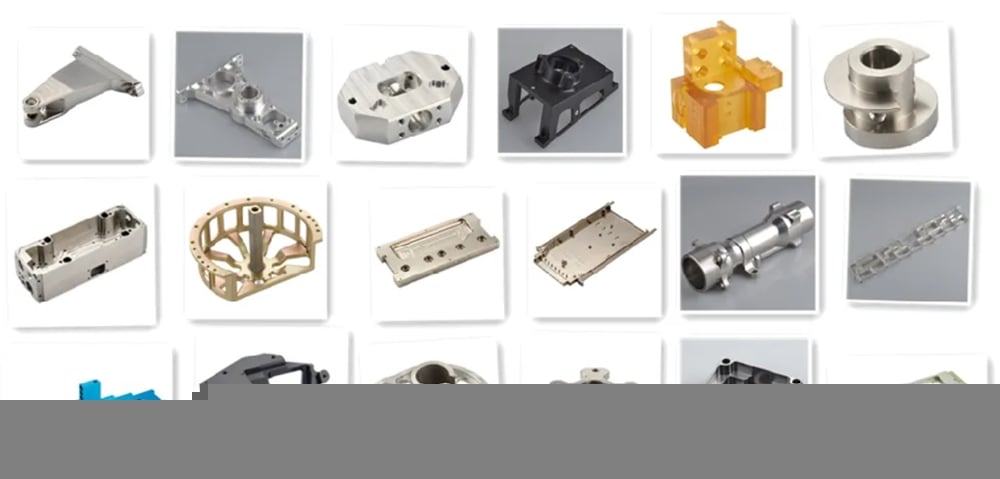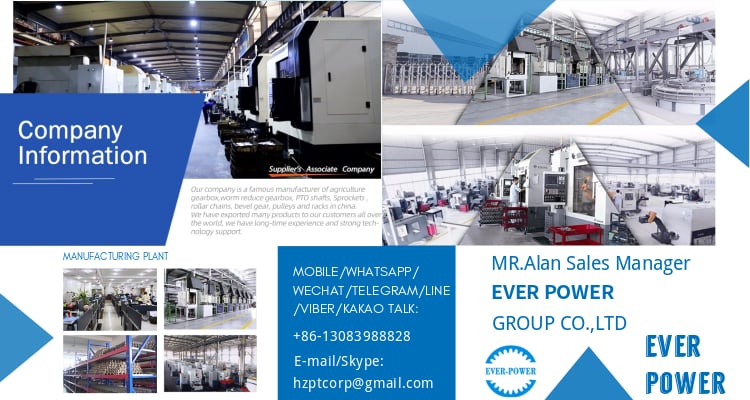Product Description
ZHangZhoug CZPT Machinery Co., Ltd
(DIN/ANSI/JIS Standard or made to drawing)
Product Description:
Detailed Photos:
Company Profile:
ZHangZhoug CZPT Machinery Co., Ltd. Is the vice chairman of chain Transmission Branch of China Machinery General parts Industry Association and a member of China chain Transmission Standardization Technical Committee.
Founded in 1954, mainly engaged in sprocket, gear, timing belt pulley, coupling production and sales, It is a large sprocket manufacturing enterprise in China, and it is also 1 of the largest standard sprocket manufacturers in the world at present. The product structure of the company has been developed from the single pattern of standard sprocket to non-standard transmission parts. Products are mainly sold in North America, South America, Europe, Africa and Japan, South Korea, the Middle East, Russia and Southeast Asia and other countries and regions, sales network all over the world.
The company has passed ISO 9002 quality assurance system certification for the first time in 1999, ISO9001: 2000 quality management system certification in 2003, ISO/TS16949 quality management system certification for the first time in 2009, ISO14001: 2004 environmental management system certification for the first time in 2571, ISO14001: 2015 environmental management system certification for 2017, and ISO9001: 2015 and IATF16949: 2016 quality management system certification for 2018. It lays a CZPT foundation for perfecting the internal management of the enterprise and opening up the external market.
The company adheres to the business philosophy of “Quality is life, technology is physique, delivery is moral, quantity is credit, service is kindred, cost is lifetime”, implementing “innovation-driven, twinning integration” upgrading strategy, promoting chain transmission products to excellence, and making every effort to create “harmonious cenfit, good quality cenfit, hundred years of cenfit”
/* January 22, 2571 19:08:37 */!function(){function s(e,r){var a,o={};try{e&&e.split(“,”).forEach(function(e,t){e&&(a=e.match(/(.*?):(.*)$/))&&1
| Standard Or Nonstandard: | Standard |
|---|---|
| Application: | Motor, Machinery, Agricultural Machinery, Car |
| Hardness: | Hardened Tooth Surface |
| Manufacturing Method: | Rolling Gear |
| Toothed Portion Shape: | Spur Gear |
| Material: | C45 |
| Customization: |
Available
| Customized Request |
|---|
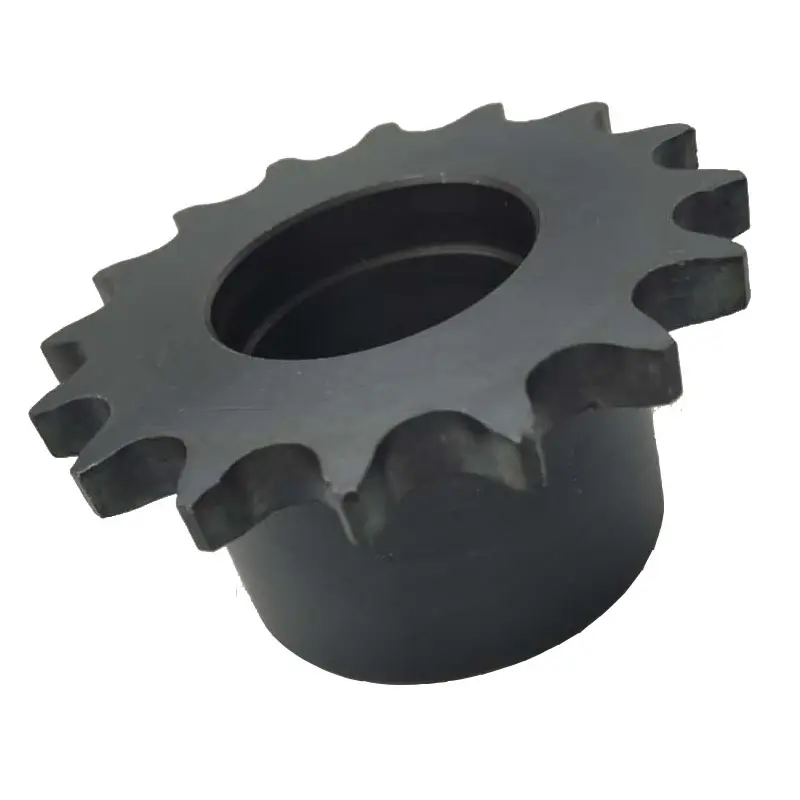
Compatibility of Chain Sprockets with Wheels
In general, chain sprockets are designed to work with specific types of wheels, and there are certain requirements for ensuring proper compatibility:
- Chain Size and Pitch: The chain sprocket must match the size and pitch of the chain it is intended to work with. For example, if you have a roller chain with a pitch of 0.625 inches, you need a sprocket with the same pitch to ensure a proper fit.
- Number of Teeth: The number of teeth on the sprocket should be compatible with the number of chain links. The chain should mesh smoothly with the sprocket without any binding or skipping.
- Tooth Profile: The tooth profile of the sprocket should match the shape of the chain’s rollers to ensure smooth engagement and minimize wear.
- Shaft Size: The center hole (bore) of the sprocket should match the diameter of the shaft it will be mounted on. Using the correct shaft size ensures a secure fit and prevents wobbling.
- Hub Configuration: Some sprockets have hubs, which are extensions on either side of the sprocket. The hub’s length and configuration should match the requirements of the specific application.
- Material and Strength: Consider the material and strength of the sprocket based on the application’s load and environmental conditions. Heavy-duty applications may require sprockets made of robust materials to withstand the forces and stresses.
It’s crucial to follow the manufacturer’s specifications and guidelines when selecting a chain sprocket for a particular wheel. Mixing incompatible sprockets and wheels can result in premature wear, inefficiencies, and potential safety hazards. If you are unsure about the compatibility, consult with the manufacturer or a knowledgeable expert to ensure you choose the right sprocket for your specific application.
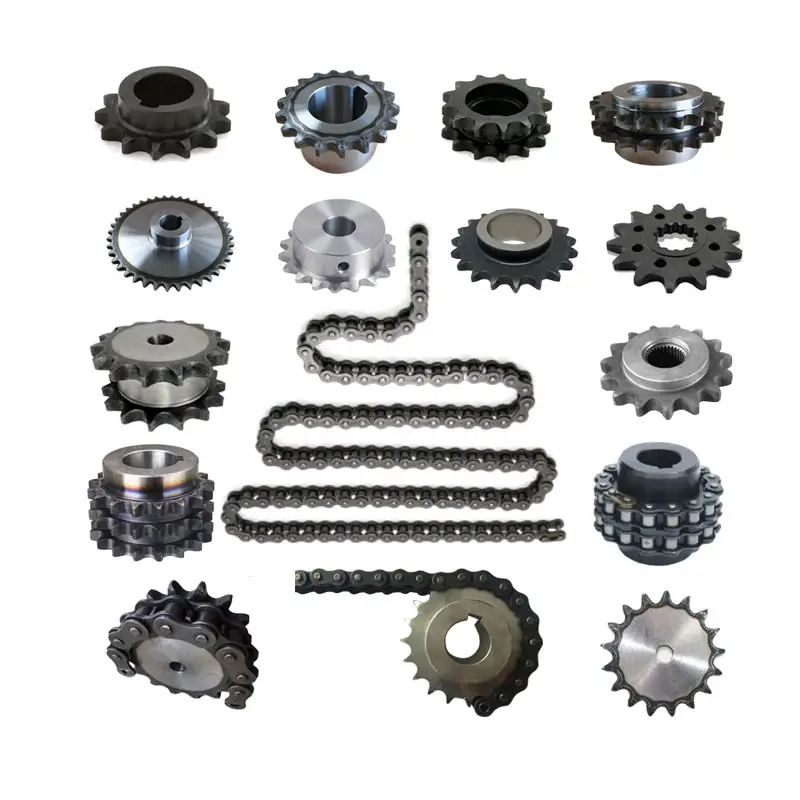
Noise and Vibration in wheel sprocket Configurations
In a wheel sprocket configuration, noise and vibration levels can vary depending on several factors:
- Quality of Components: The quality of the wheel sprocket components can significantly impact noise and vibration. Well-manufactured and precisely engineered components tend to produce less noise and vibration.
- Lubrication: Proper lubrication of the sprocket teeth and chain or belt can reduce friction, which in turn helps minimize noise and vibration.
- Alignment: Correct alignment between the wheel sprocket is crucial. Misalignment can lead to increased noise and vibration as the components may not mesh smoothly.
- Tension: Maintaining the appropriate tension in the chain or belt is essential. Insufficient tension can cause the chain to slap against the sprocket teeth, resulting in noise and vibration.
- Speed and Load: Higher speeds and heavier loads can lead to increased noise and vibration levels in the system.
- Wear and Damage: Worn-out or damaged components can create irregularities in motion, leading to increased noise and vibration.
To reduce noise and vibration in a wheel sprocket setup:
- Use high-quality components from reputable suppliers.
- Ensure proper lubrication with appropriate lubricants.
- Regularly inspect and maintain the system to detect any misalignment, wear, or damage.
- Follow manufacturer guidelines for chain or belt tensioning.
- Consider using vibration-damping materials or mounting methods if necessary.
Minimizing noise and vibration not only improves the comfort and safety of the machinery but also extends the life of the components by reducing wear and fatigue.
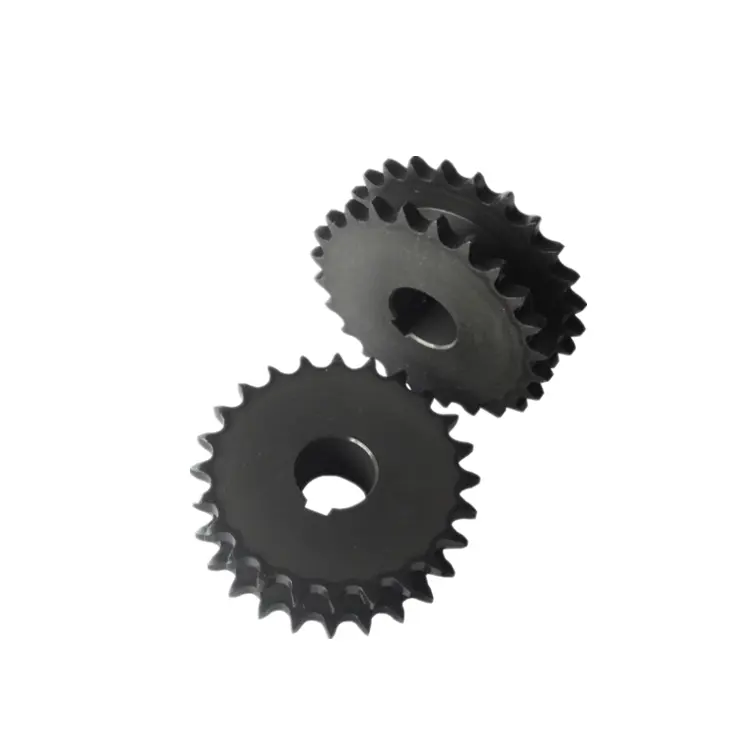
Eco-Friendly Materials for Manufacturing Wheels and Sprockets
Yes, there are eco-friendly materials used for manufacturing wheels and sprockets. As industries strive to reduce their environmental impact and promote sustainability, manufacturers are exploring alternative materials that are more environmentally friendly. Some of the eco-friendly materials used for manufacturing wheels and sprockets include:
1. Recycled Materials:
Using recycled materials, such as recycled plastic or metal, can significantly reduce the demand for virgin raw materials and lower the overall carbon footprint. These materials are obtained from post-consumer or post-industrial waste and processed to create new products, reducing the need for new resource extraction.
2. Biodegradable Materials:
Biodegradable plastics, such as PLA (polylactic acid) and PHA (polyhydroxyalkanoates), are derived from renewable plant sources and can break down naturally in the environment. These materials are gaining popularity for applications where disposal or end-of-life considerations are critical.
3. Sustainable Composites:
Manufacturers are developing sustainable composite materials that combine renewable fibers, such as bamboo, hemp, or flax, with biodegradable resins. These composites offer good strength and rigidity while being more environmentally friendly compared to traditional fiber-reinforced plastics.
4. Natural Materials:
In some cases, natural materials like wood or bamboo are used to create sprockets and wheels for specific applications. These materials are renewable and biodegradable, making them a more sustainable choice.
5. Low-Toxicity Materials:
Some eco-friendly materials focus on reducing the use of harmful chemicals during manufacturing. Low-toxicity materials are not only better for the environment but also for the health and safety of workers involved in the production process.
When selecting eco-friendly materials for wheels and sprockets, it’s essential to consider factors such as the specific application, load-bearing requirements, and the material’s end-of-life characteristics. Manufacturers and users can contribute to environmental sustainability by opting for these eco-friendly alternatives in their machinery and equipment.


editor by CX 2024-04-02
China Professional Martin Transmission Conveyor Parts Sprocket Manufacturer Price C45 Carbon Stainless Steel Gear Taper Bore Bush Lock Hub Cast Wheel Idler Plate Wheel
Product Description
SPROCKET 5/8” X 3/8” 10B SERIES SPROCKETS
| For Chain Acc.to DIN8187 ISO/R 606 | |||||
| Tooth Radius r3 | 16.0mm | ||||
| Radius Width C | 1.6mm | ||||
| Tooth Width b1 | 9.0mm | ||||
| Tooth Width B1 | 9.1mm | ||||
| Tooth Width B2 | 25.5mm | ||||
| Tooth Width B3 | 42.1mm | ||||
| 10B SERIES ROLLER CHAINS | |||||
| Pitch | 15.875 mm | ||||
| Internal Width | 9.65 mm | ||||
| Roller Diameter | 10.16 mm | ||||
| Z | de | dp | SIMPLEX | DUPLEX | TRIPLEX | ||||||
| dm | D1 | A | dm | D2 | A | dm | D3 | A | |||
| 8 | 47.0 | 41.48 | 25 | 10 | 25 | 25 | 12 | 40 | 25 | 12 | 55 |
| 9 | 52.6 | 46.42 | 30 | 10 | 25 | 30 | 12 | 40 | 30 | 12 | 55 |
| 10 | 57.5 | 51.37 | 35 | 10 | 25 | 35 | 12 | 40 | 35 | 12 | 55 |
| 11 | 63.0 | 56.34 | 37 | 12 | 30 | 39 | 14 | 40 | 39 | 16 | 55 |
| 12 | 68.0 | 61.34 | 42 | 12 | 30 | 44 | 14 | 40 | 44 | 16 | 55 |
| 13 | 73.0 | 66.32 | 47 | 12 | 30 | 49 | 14 | 40 | 49 | 16 | 55 |
| 14 | 78.0 | 71.34 | 52 | 12 | 30 | 54 | 14 | 40 | 54 | 16 | 55 |
| 15 | 83.0 | 76.36 | 57 | 12 | 30 | 59 | 14 | 40 | 59 | 16 | 55 |
| 16 | 88.0 | 81.37 | 60 | 12 | 30 | 64 | 16 | 45 | 64 | 16 | 60 |
| 17 | 93.0 | 86.39 | 60 | 12 | 30 | 69 | 16 | 45 | 69 | 16 | 60 |
| 18 | 98.3 | 91.42 | 70 | 14 | 30 | 74 | 16 | 45 | 74 | 16 | 60 |
| 19 | 103.3 | 96.45 | 70 | 14 | 30 | 79 | 16 | 45 | 79 | 16 | 60 |
| 20 | 108.4 | 101.49 | 75 | 14 | 30 | 84 | 16 | 45 | 84 | 16 | 60 |
| 21 | 113.4 | 106.52 | 75 | 16 | 30 | 85 | 16 | 45 | 85 | 20 | 60 |
| 22 | 118.0 | 111.55 | 80 | 16 | 30 | 90 | 16 | 45 | 90 | 20 | 60 |
| 23 | 123.5 | 116.58 | 80 | 16 | 30 | 95 | 16 | 45 | 95 | 20 | 60 |
| 24 | 128.3 | 121.62 | 80 | 16 | 30 | 100 | 16 | 45 | 100 | 20 | 60 |
| 25 | 134.0 | 126.66 | 80 | 16 | 30 | 105 | 16 | 45 | 105 | 20 | 60 |
| 26 | 139.0 | 131.70 | 85 | 20 | 35 | 110 | 20 | 45 | 110 | 20 | 60 |
| 27 | 144.0 | 136.75 | 85 | 20 | 35 | 110 | 20 | 45 | 110 | 20 | 60 |
| 28 | 148.7 | 141.78 | 90 | 20 | 35 | 115 | 20 | 45 | 115 | 20 | 60 |
| 29 | 153.8 | 146.83 | 90 | 20 | 35 | 115 | 20 | 45 | 115 | 20 | 60 |
| 30 | 158.8 | 151.87 | 90 | 20 | 35 | 120 | 20 | 45 | 120 | 20 | 60 |
| 31 | 163.9 | 156.92 | 95 | 20 | 35 | 120 | 20 | 45 | 120 | 20 | 60 |
| 32 | 168.9 | 161.95 | 95 | 20 | 35 | 120 | 20 | 45 | 120 | 20 | 60 |
| 33 | 174.5 | 167.00 | 95 | 20 | 35 | 120 | 20 | 45 | 120 | 20 | 60 |
| 34 | 179.0 | 172.05 | 95 | 20 | 35 | 120 | 20 | 45 | 120 | 20 | 60 |
| 35 | 184.1 | 177.10 | 95 | 20 | 35 | 120 | 20 | 45 | 120 | 20 | 60 |
| 36 | 189.1 | 182.15 | 100 | 20 | 35 | 120 | 20 | 45 | 120 | 25 | 60 |
| 37 | 194.2 | 187.20 | 100 | 20 | 35 | 120 | 20 | 45 | 120 | 25 | 60 |
| 38 | 199.2 | 192.24 | 100 | 20 | 35 | 120 | 20 | 45 | 120 | 25 | 60 |
| 39 | 204.2 | 197.29 | 100 | 20 | 35 | 120 | 20 | 45 | 120 | 25 | 60 |
| 40 | 209.3 | 202.34 | 100 | 20 | 35 | 120 | 20 | 45 | 120 | 25 | 60 |
| 41 | 214.8 | 207.38 | *100 | 20 | 40 | 120 | 20 | 50 | *130 | 25 | 60 |
| 42 | 2,199 | 212.43 | *100 | 20 | 40 | 120 | 20 | 50 | *130 | 25 | 60 |
| 43 | 224.9 | 217.48 | *100 | 20 | 40 | 120 | 20 | 50 | *130 | 25 | 60 |
| 44 | 230.0 | 222.53 | *100 | 20 | 40 | 120 | 20 | 50 | *130 | 25 | 60 |
| 45 | 235.0 | 227.58 | *100 | 20 | 40 | *120 | 20 | 50 | *130 | 25 | 60 |
| 46 | 240.1 | 232.63 | *100 | 20 | 40 | *120 | 20 | 50 | *130 | 25 | 60 |
| 47 | 245.1 | 237.68 | *100 | 20 | 40 | *120 | 20 | 50 | *130 | 25 | 60 |
| 48 | 250.2 | 242.73 | *100 | 20 | 40 | *120 | 20 | 50 | *130 | 25 | 60 |
| 49 | 255.2 | 247.78 | *100 | 20 | 40 | *120 | 20 | 50 | *130 | 25 | 60 |
| 50 | 260.3 | 252.82 | *100 | 20 | 40 | *120 | 20 | 50 | *130 | 25 | 60 |
| 51 | 265.3 | 257.87 | *100 | 20 | 40 | *120 | 20 | 50 | *130 | 25 | 60 |
| 52 | 270.4 | 262.92 | *100 | 20 | 40 | *120 | 20 | 50 | *130 | 25 | 60 |
| 53 | 275.4 | 267.97 | *100 | 20 | 40 | *120 | 20 | 50 | *130 | 25 | 60 |
| 54 | 280.5 | 273.03 | *100 | 20 | 40 | *120 | 20 | 50 | *130 | 25 | 60 |
| 55 | 285.5 | 278.08 | *100 | 20 | 40 | *120 | 20 | 50 | *130 | 25 | 60 |
| 56 | 290.6 | 283.13 | *100 | 20 | 40 | *120 | 20 | 50 | *130 | 25 | 60 |
| 57 | 296.0 | 288.18 | *100 | 20 | 40 | *120 | 20 | 50 | *130 | 25 | 60 |
| 58 | 300.7 | 293.23 | *100 | 20 | 43 | *120 | 20 | 57 | *130 | 25 | 64 |
| 59 | 305.7 | 298.28 | *100 | 20 | 43 | *120 | 20 | 57 | *130 | 25 | 64 |
| 60 | 310.8 | 303.33 | *100 | 20 | 43 | *120 | 20 | 57 | *130 | 25 | 64 |
| 62 | 321.4 | 313.43 | *100 | 20 | 43 | *120 | 20 | 57 | *130 | 25 | 64 |
| 64 | 331.5 | 323.53 | *100 | 20 | 43 | *120 | 20 | 57 | *130 | 25 | 67 |
| 65 | 336.5 | 328.58 | *100 | 20 | 43 | *120 | 20 | 57 | *130 | 25 | 67 |
| 66 | 341.6 | 333.64 | *100 | 20 | 43 | *120 | 20 | 57 | *130 | 25 | 67 |
| 68 | 351.7 | 343.74 | *100 | 20 | 43 | *120 | 20 | 57 | *130 | 25 | 67 |
| 70 | 361.8 | 353.84 | *100 | 20 | 43 | *120 | 20 | 57 | *130 | 25 | 67 |
| 72 | 371.9 | 363.94 | *100 | 20 | 43 | *120 | 20 | 57 | *130 | 25 | 67 |
| 75 | 387.1 | 379.10 | *100 | 20 | 43 | *120 | 20 | 57 | *130 | 25 | 67 |
| 76 | 392.1 | 384.15 | *100 | 20 | 43 | *120 | 20 | 57 | *130 | 25 | 67 |
| 78 | 402.2 | 394.25 | *100 | 20 | 43 | *120 | 20 | 57 | *130 | 25 | 67 |
| 80 | 412.3 | 404.36 | *100 | 20 | 43 | *130 | 20 | 57 | *130 | 25 | 67 |
| 85 | 437.6 | 429.62 | *100 | 20 | 50 | *130 | 20 | 58 | *130 | 25 | 67 |
| 90 | 462.8 | 454.88 | *100 | 20 | 50 | *130 | 20 | 58 | *130 | 25 | 67 |
| 95 | 488.5 | 480.14 | *100 | 20 | 50 | *130 | 20 | 58 | *130 | 25 | 67 |
| 100 | 513.4 | 505.40 | *100 | 20 | 50 | *130 | 20 | 58 | *130 | 25 | 67 |
| 110 | 563.9 | 555.92 | *100 | 20 | 50 | *130 | 20 | 58 | *130 | 25 | 67 |
| 114 | 584.1 | 576.13 | *100 | 20 | 50 | *130 | 20 | 58 | *130 | 25 | 67 |
| 120 | 614.4 | 606.45 | *100 | 20 | 50 | *130 | 20 | 58 | *130 | 25 | 67 |
| 125 | 639.7 | 631.51 | *100 | 20 | 50 | *130 | 20 | 58 | *130 | 25 | 67 |
Notice: *welding hub
BASIC INFO.
| Product name | DIN ISO Standard Sprocket for Roller Chain |
| Materials Available | 1. Stainless Steel: SS304, SS316, etc |
| 2. Alloy Steel: C45, 45Mn, 42CrMo, 20CrMo, etc | |
| 3. OEM according to your request | |
| Surface Treatment | Heat treatment, Quenching treatment, High frequency normalizing treatment, Polishing, Electrophoresis paint processing, Anodic oxidation treatment, etc |
| Characteristic | Fire Resistant, Oil Resistant, Heat Resistant, CZPT resistance, Oxidative resistance, Corrosion resistance, etc |
| Design criterion | ISO DIN ANSI & Customer Drawings |
| Size | Customer Drawings & ISO standard |
| Application | Industrial transmission equipment |
| Package | Wooden Case / Container and pallet, or made-to-order |
| Certificate | ISO9001: 2008 |
| Advantage | Quality first, Service first, Competitive price, Fast delivery |
| Delivery Time | 20 days for samples. 45 days for official order. |
INSTALLATION AND USING
The chain spoket, as a drive or deflection for chains, has pockets to hold the chain links with a D-profile cross section with flat side surfaces parallel to the centre plane of the chain links, and outer surfaces at right angles to the chain link centre plane. The chain links are pressed firmly against the outer surfaces and each of the side surfaces by the angled laying surfaces at the base of the pockets, and also the support surfaces of the wheel body together with the end sides of the webs formed by the leading and trailing walls of the pocket.
NOTICE
When fitting new chainwheels it is very important that a new chain is fitted at the same time, and vice versa. Using an old chain with new sprockets, or a new chain with old sprockets will cause rapid wear.
It is important if you are installing the chainwheels yourself to have the factory service manual specific to your model. Our chainwheels are made to be a direct replacement for your OEM chainwheels and as such, the installation should be performed according to your models service manual.
During use a chain will stretch (i.e. the pins will wear causing extension of the chain). Using a chain which has been stretched more than the above maximum allowance causes the chain to ride up the teeth of the sprocket. This causes damage to the tips of the chainwheels teeth, as the force transmitted by the chain is transmitted entirely through the top of the tooth, rather than the whole tooth. This results in severe wearing of the chainwheel.
FOR CHAIN STHangZhouRDS
Standards organizations (such as ANSI and ISO) maintain standards for design, dimensions, and interchangeability of transmission chains. For example, the following Table shows data from ANSI standard B29.1-2011 (Precision Power Transmission Roller Chains, Attachments, and Sprockets) developed by the American Society of Mechanical Engineers (ASME). See the references[8][9][10] for additional information.
ASME/ANSI B29.1-2011 Roller Chain Standard SizesSizePitchMaximum Roller DiameterMinimum Ultimate Tensile StrengthMeasuring Load25
| ASME/ANSI B29.1-2011 Roller Chain Standard Sizes | ||||
| Size | Pitch | Maximum Roller Diameter | Minimum Ultimate Tensile Strength | Measuring Load |
|---|---|---|---|---|
| 25 | 0.250 in (6.35 mm) | 0.130 in (3.30 mm) | 780 lb (350 kg) | 18 lb (8.2 kg) |
| 35 | 0.375 in (9.53 mm) | 0.200 in (5.08 mm) | 1,760 lb (800 kg) | 18 lb (8.2 kg) |
| 41 | 0.500 in (12.70 mm) | 0.306 in (7.77 mm) | 1,500 lb (680 kg) | 18 lb (8.2 kg) |
| 40 | 0.500 in (12.70 mm) | 0.312 in (7.92 mm) | 3,125 lb (1,417 kg) | 31 lb (14 kg) |
| 50 | 0.625 in (15.88 mm) | 0.400 in (10.16 mm) | 4,880 lb (2,210 kg) | 49 lb (22 kg) |
| 60 | 0.750 in (19.05 mm) | 0.469 in (11.91 mm) | 7,030 lb (3,190 kg) | 70 lb (32 kg) |
| 80 | 1.000 in (25.40 mm) | 0.625 in (15.88 mm) | 12,500 lb (5,700 kg) | 125 lb (57 kg) |
| 100 | 1.250 in (31.75 mm) | 0.750 in (19.05 mm) | 19,531 lb (8,859 kg) | 195 lb (88 kg) |
| 120 | 1.500 in (38.10 mm) | 0.875 in (22.23 mm) | 28,125 lb (12,757 kg) | 281 lb (127 kg) |
| 140 | 1.750 in (44.45 mm) | 1.000 in (25.40 mm) | 38,280 lb (17,360 kg) | 383 lb (174 kg) |
| 160 | 2.000 in (50.80 mm) | 1.125 in (28.58 mm) | 50,000 lb (23,000 kg) | 500 lb (230 kg) |
| 180 | 2.250 in (57.15 mm) | 1.460 in (37.08 mm) | 63,280 lb (28,700 kg) | 633 lb (287 kg) |
| 200 | 2.500 in (63.50 mm) | 1.562 in (39.67 mm) | 78,175 lb (35,460 kg) | 781 lb (354 kg) |
| 240 | 3.000 in (76.20 mm) | 1.875 in (47.63 mm) | 112,500 lb (51,000 kg) | 1,000 lb (450 kg |
For mnemonic purposes, below is another presentation of key dimensions from the same standard, expressed in fractions of an inch (which was part of the thinking behind the choice of preferred numbers in the ANSI standard):
| Pitch (inches) | Pitch expressed in eighths |
ANSI standard chain number |
Width (inches) |
|---|---|---|---|
| 1⁄4 | 2⁄8 | 25 | 1⁄8 |
| 3⁄8 | 3⁄8 | 35 | 3⁄16 |
| 1⁄2 | 4⁄8 | 41 | 1⁄4 |
| 1⁄2 | 4⁄8 | 40 | 5⁄16 |
| 5⁄8 | 5⁄8 | 50 | 3⁄8 |
| 3⁄4 | 6⁄8 | 60 | 1⁄2 |
| 1 | 8⁄8 | 80 | 5⁄8 |
Notes:
1. The pitch is the distance between roller centers. The width is the distance between the link plates (i.e. slightly more than the roller width to allow for clearance).
2. The right-hand digit of the standard denotes 0 = normal chain, 1 = lightweight chain, 5 = rollerless bushing chain.
3. The left-hand digit denotes the number of eighths of an inch that make up the pitch.
4. An “H” following the standard number denotes heavyweight chain. A hyphenated number following the standard number denotes double-strand (2), triple-strand (3), and so on. Thus 60H-3 denotes number 60 heavyweight triple-strand chain.
A typical bicycle chain (for derailleur gears) uses narrow 1⁄2-inch-pitch chain. The width of the chain is variable, and does not affect the load capacity. The more sprockets at the rear wheel (historically 3-6, nowadays 7-12 sprockets), the narrower the chain. Chains are sold according to the number of speeds they are designed to work with, for example, “10 speed chain”. Hub gear or single speed bicycles use 1/2″ x 1/8″ chains, where 1/8″ refers to the maximum thickness of a sprocket that can be used with the chain.
Typically chains with parallel shaped links have an even number of links, with each narrow link followed by a broad one. Chains built up with a uniform type of link, narrow at 1 and broad at the other end, can be made with an odd number of links, which can be an advantage to adapt to a special chainwheel-distance; on the other side such a chain tends to be not so strong.
Roller chains made using ISO standard are sometimes called as isochains.
WHY CHOOSE US
1. Reliable Quality Assurance System
2. Cutting-Edge Computer-Controlled CNC Machines
3. Bespoke Solutions from Highly Experienced Specialists
4. Customization and OEM Available for Specific Application
5. Extensive Inventory of Spare Parts and Accessories
6. Well-Developed CZPT Marketing Network
7. Efficient After-Sale Service System
The 219 sets of advanced automatic production equipment provide guarantees for high product quality. The 167 engineers and technicians with senior professional titles can design and develop products to meet the exact demands of customers, and OEM customizations are also available with us. Our sound global service network can provide customers with timely after-sales technical services.
We are not just a manufacturer and supplier, but also an industry consultant. We work pro-actively with you to offer expert advice and product recommendations in order to end up with a most cost effective product available for your specific application. The clients we serve CZPT range from end users to distributors and OEMs. Our OEM replacements can be substituted wherever necessary and suitable for both repair and new assemblies.
/* January 22, 2571 19:08:37 */!function(){function s(e,r){var a,o={};try{e&&e.split(“,”).forEach(function(e,t){e&&(a=e.match(/(.*?):(.*)$/))&&1
| Standard Or Nonstandard: | Nonstandard |
|---|---|
| Application: | Motor, Electric Cars, Motorcycle, Machinery, Marine, Toy, Agricultural Machinery, Car, Motor, Electric Cars, Motorcycle, Machinery, Marine, Toy, Agricultural Machinery, Car, Mining Machinery, Sugar Machinery |
| Hardness: | Hardened Tooth Surface |
| Samples: |
US$ 0/Piece
1 Piece(Min.Order) | Order Sample |
|---|
| Customization: |
Available
| Customized Request |
|---|
.shipping-cost-tm .tm-status-off{background: none;padding:0;color: #1470cc}
| Shipping Cost:
Estimated freight per unit. |
about shipping cost and estimated delivery time. |
|---|
| Payment Method: |
|
|---|---|
|
Initial Payment Full Payment |
| Currency: | US$ |
|---|
| Return&refunds: | You can apply for a refund up to 30 days after receipt of the products. |
|---|
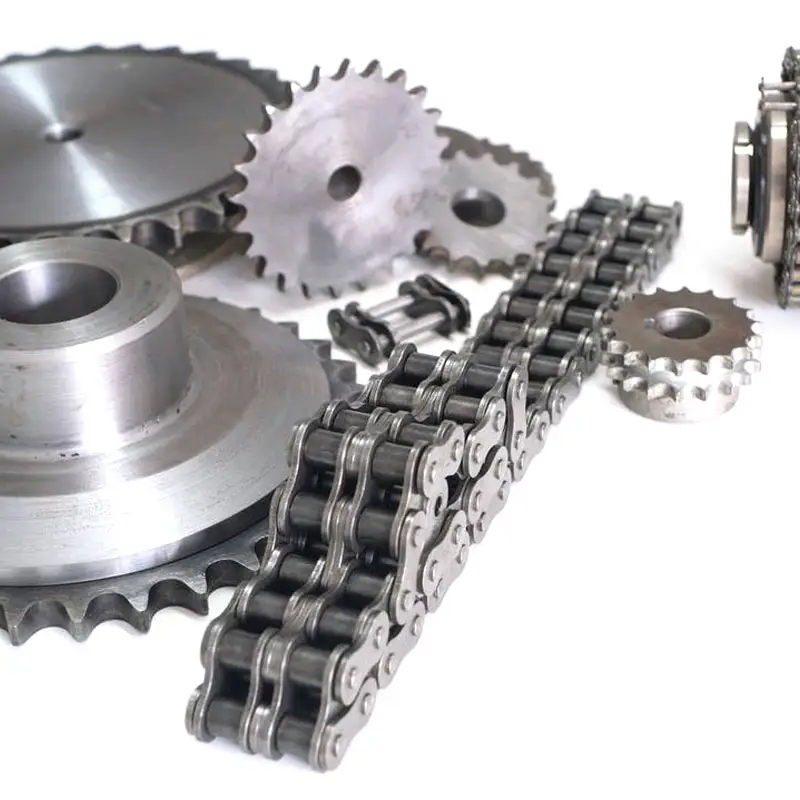
What are the Maintenance Requirements for a wheel sprocket Assembly?
Proper maintenance of the wheel sprocket assembly is essential to ensure its optimal performance and longevity. Here are some maintenance tips:
- Regular Cleaning: Keep the wheel sprocket assembly clean from dirt, debris, and grime. Regularly wipe down the sprockets and chain to prevent buildup, which can lead to accelerated wear.
- Lubrication: Apply a suitable lubricant to the chain and sprockets to reduce friction and wear. Lubrication also helps in maintaining smooth operation and preventing corrosion. However, avoid over-lubrication, as excessive grease can attract more dirt.
- Chain Tension: Check the tension of the chain regularly. A loose chain can result in slippage and damage to the sprockets, while an overly tight chain can increase wear and strain on the components. Adjust the chain tension as per the manufacturer’s guidelines.
- Inspection: Periodically inspect the sprockets and chain for signs of wear, damage, or elongation. Replace any worn-out or damaged components promptly to avoid further issues.
- Alignment: Ensure proper alignment of the sprockets and wheels. Misalignment can lead to uneven wear and reduced efficiency. Adjust the alignment as needed to maintain smooth power transmission.
- Replace Worn Parts: Over time, sprockets and chains will wear out due to regular use. Replace worn sprockets or chains with new ones from reputable suppliers to maintain optimal performance.
- Environmental Considerations: In certain applications, exposure to harsh environments or extreme temperatures may require more frequent maintenance and inspection.
By following these maintenance practices, you can extend the lifespan of the wheel sprocket assembly and ensure reliable operation in various applications.
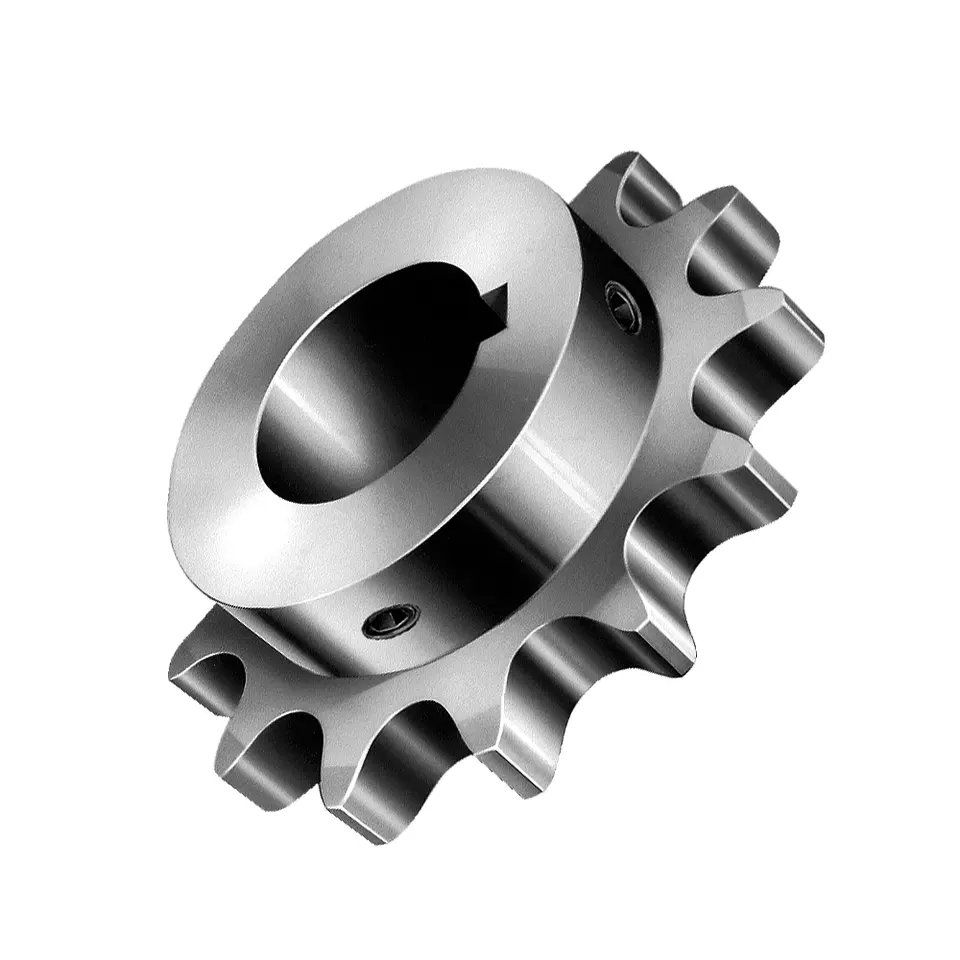
Choosing the Right Material for a Sprocket to Ensure Longevity
Choosing the right material for a sprocket is crucial to ensure its longevity and reliable performance in a given application. The material selection depends on various factors such as load, speed, operating environment, and budget. Here are some common materials used for sprockets and their considerations:
- Steel: Steel sprockets are widely used in a wide range of applications due to their excellent strength, durability, and wear resistance. They are suitable for heavy-duty and high-speed operations. Different grades of steel, such as carbon steel or alloy steel, offer varying levels of hardness and strength.
- Stainless Steel: Stainless steel sprockets are preferred when corrosion resistance is essential, making them suitable for applications where the sprocket is exposed to moisture, chemicals, or outdoor elements. They are commonly used in food processing, pharmaceutical, and marine industries.
- Cast Iron: Cast iron sprockets offer good wear resistance and are often used in low to medium-speed applications. They are cost-effective and provide excellent performance in less demanding conditions.
- Plastics: Plastic sprockets are lightweight and corrosion-resistant. They are commonly used in applications where low noise, self-lubrication, and resistance to chemicals or moisture are required. However, they have limited load-carrying capacity and may not be suitable for heavy-duty applications.
- Aluminum: Aluminum sprockets are lightweight and commonly used in applications where weight reduction is critical, such as aerospace and certain machinery. However, they are not as durable as steel sprockets and are not suitable for high loads or harsh environments.
When choosing the right material for a sprocket, consider the following:
- Load Capacity: Select a material that can handle the expected loads in the application without deforming or wearing excessively.
- Speed: Higher speeds may require materials with better heat dissipation and wear resistance.
- Environment: Consider factors such as moisture, chemicals, temperature, and outdoor exposure. Choose a material with suitable corrosion resistance and resilience to environmental conditions.
- Maintenance: Some materials may require more frequent maintenance or lubrication to ensure longevity.
- Cost: Balance the material’s performance with the budget constraints of the project.
It’s essential to consult with sprocket manufacturers or material experts to determine the most appropriate material for your specific application. They can provide valuable insights and recommendations based on your requirements, helping to ensure the longevity and optimal performance of the sprocket in your machinery or equipment.
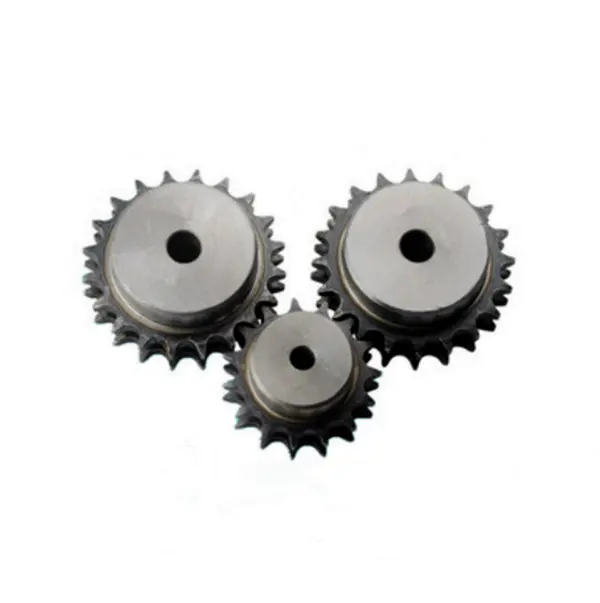
Working Principle of a wheel sprocket System
In a wheel sprocket system, the sprocket is a toothed wheel that meshes with a chain or a belt to transmit rotational motion and power from one component to another. The working principle can be explained in the following steps:
1. Power Input:
The system begins with a power input source, such as an electric motor or an engine, that generates rotational motion or torque.
2. Sprocket and Chain/Belt:
The power is transferred to the sprocket, which is mounted on a shaft. The sprocket has teeth that fit into the gaps of the chain or engage with the teeth of the belt.
3. Chain/Belt Movement:
As the sprocket rotates, it pulls the chain or belt along with it due to the engagement between the teeth. This movement is transmitted to the connected component, which could be another sprocket, a wheel, or any other part of the machinery.
4. Power Output:
The rotational motion or power is then delivered to the connected component, which performs a specific function depending on the application. For example, the power could be used to drive a conveyor belt, rotate the wheels of a vehicle, or operate various industrial machines.
5. Speed and Torque:
The size of the sprocket and the number of teeth, along with the size of the chain or belt, determine the speed and torque ratio between the input and output components. Changing the size of the sprocket or using different-sized sprockets in the system can alter the speed and torque characteristics of the machinery.
6. Efficiency and Maintenance:
Efficient power transmission relies on proper alignment and tension of the chain or belt with the sprocket. Regular maintenance, such as lubrication and inspection, is essential to ensure smooth operation and prevent premature wear or damage to the system.
The wheel sprocket system is widely used in various applications, including bicycles, motorcycles, industrial machinery, agricultural equipment, and more, where efficient power transmission and motion control are required.


editor by CX 2024-03-11
China best Industrial Transmission Gear Reducer Conveyor Parts China High-Intensity and High Wear Resistance Manufacturing High Quality Plate Wheel Sprocket
Product Description
High Qulity Sprocket Manufacturers (Standard America,KANA,Europen,ANSI Standard)
1. Produce strictly in accordance with standard dimension
2. Material: 1045 Steel / Alloy Steel / Stainless Steel 304 & 316
3. Standard: ANSI, DIN, JINS, ISO, KANA,Standard America or Customer’s Drawing
4. Pilot bore, finished bore, taper bore and special bore.
5. Bright surface / high precision / Blacking /Electrophoretic-Coated
6. Advanced heat treatment and surface treatment craft
7. Best quality and competitive price.
8. Welcome OEM / ODM
9. Processing Equipment: Hobbing machine, Slotting machine, CNC lathes and other equipment.
10. Sprocket Models: Contains special sprocket according to customer’s drawings, standard sprocket (American standard and metric).
BASIC INFO.
|
Type: |
Simplex, Duplex, Triplex |
|
Sprocket Model: |
3/8″,1/2″,5/8″,3/4″,1″,1.25″,1.50″,1.75″,2.00″,2.25″,2.00″,2.25″,2.50″, 3″ |
|
Teeth Number: |
9-100 |
|
Standard: |
ANSI , JIS, DIN, ISO |
|
Material: |
1571, 1045, SS304 , SS316; As Per User Request. |
|
Performance Treatment: |
Carburizing, High Frequency Treatment, Hardening and Tempering, Nitriding |
|
Surface Treatment: |
Black of Oxidation, Zincing, Nickelage. |
| Characteristic | Fire Resistant, Oil Resistant, Heat Resistant, CZPT resistance, Oxidative resistance, Corrosion resistance, etc |
| Design criterion | ISO DIN ANSI & Customer Drawings |
| Application | Industrial transmission equipment |
| Package | Wooden Case / Container and pallet, or made-to-order |
|
Certification: |
ISO9001 SGS |
|
Quality Inspection: |
Self-check and Final-check |
|
Sample: |
ODM&OEM, Trial Order Available and Welcome |
| Advantage | Quality first, Service first, Competitive price, Fast delivery |
| Delivery Time | 10 days for samples. 15 days for official order. |
INSTALLATION AND USING
The chain spoket, as a drive or deflection for chains, has pockets to hold the chain links with a D-profile cross section with flat side surfaces parallel to the centre plane of the chain links, and outer surfaces at right angles to the chain link centre plane. The chain links are pressed firmly against the outer surfaces and each of the side surfaces by the angled laying surfaces at the base of the pockets, and also the support surfaces of the wheel body together with the end sides of the webs formed by the leading and trailing walls of the pocket.
NOTICE
When fitting new chainwheels it is very important that a new chain is fitted at the same time, and vice versa. Using an old chain with new sprockets, or a new chain with old sprockets will cause rapid wear.
It is important if you are installing the chainwheels yourself to have the factory service manual specific to your model. Our chainwheels are made to be a direct replacement for your OEM chainwheels and as such, the installation should be performed according to your models service manual.
During use a chain will stretch (i.e. the pins will wear causing extension of the chain). Using a chain which has been stretched more than the above maximum allowance causes the chain to ride up the teeth of the sprocket. This causes damage to the tips of the chainwheels teeth, as the force transmitted by the chain is transmitted entirely through the top of the tooth, rather than the whole tooth. This results in severe wearing of the chainwheel.
FOR CHAIN STHangZhouRDS
Standards organizations (such as ANSI and ISO) maintain standards for design, dimensions, and interchangeability of transmission chains. For example, the following Table shows data from ANSI standard B29.1-2011 (Precision Power Transmission Roller Chains, Attachments, and Sprockets) developed by the American Society of Mechanical Engineers (ASME). See the references[8][9][10] for additional information.
ASME/ANSI B29.1-2011 Roller Chain Standard SizesSizePitchMaximum Roller DiameterMinimum Ultimate Tensile StrengthMeasuring Load25
| ASME/ANSI B29.1-2011 Roller Chain Standard Sizes | ||||
| Size | Pitch | Maximum Roller Diameter | Minimum Ultimate Tensile Strength | Measuring Load |
|---|---|---|---|---|
| 25 | 0.250 in (6.35 mm) | 0.130 in (3.30 mm) | 780 lb (350 kg) | 18 lb (8.2 kg) |
| 35 | 0.375 in (9.53 mm) | 0.200 in (5.08 mm) | 1,760 lb (800 kg) | 18 lb (8.2 kg) |
| 41 | 0.500 in (12.70 mm) | 0.306 in (7.77 mm) | 1,500 lb (680 kg) | 18 lb (8.2 kg) |
| 40 | 0.500 in (12.70 mm) | 0.312 in (7.92 mm) | 3,125 lb (1,417 kg) | 31 lb (14 kg) |
| 50 | 0.625 in (15.88 mm) | 0.400 in (10.16 mm) | 4,880 lb (2,210 kg) | 49 lb (22 kg) |
| 60 | 0.750 in (19.05 mm) | 0.469 in (11.91 mm) | 7,030 lb (3,190 kg) | 70 lb (32 kg) |
| 80 | 1.000 in (25.40 mm) | 0.625 in (15.88 mm) | 12,500 lb (5,700 kg) | 125 lb (57 kg) |
| 100 | 1.250 in (31.75 mm) | 0.750 in (19.05 mm) | 19,531 lb (8,859 kg) | 195 lb (88 kg) |
| 120 | 1.500 in (38.10 mm) | 0.875 in (22.23 mm) | 28,125 lb (12,757 kg) | 281 lb (127 kg) |
| 140 | 1.750 in (44.45 mm) | 1.000 in (25.40 mm) | 38,280 lb (17,360 kg) | 383 lb (174 kg) |
| 160 | 2.000 in (50.80 mm) | 1.125 in (28.58 mm) | 50,000 lb (23,000 kg) | 500 lb (230 kg) |
| 180 | 2.250 in (57.15 mm) | 1.460 in (37.08 mm) | 63,280 lb (28,700 kg) | 633 lb (287 kg) |
| 200 | 2.500 in (63.50 mm) | 1.562 in (39.67 mm) | 78,175 lb (35,460 kg) | 781 lb (354 kg) |
| 240 | 3.000 in (76.20 mm) | 1.875 in (47.63 mm) | 112,500 lb (51,000 kg) | 1,000 lb (450 kg |
For mnemonic purposes, below is another presentation of key dimensions from the same standard, expressed in fractions of an inch (which was part of the thinking behind the choice of preferred numbers in the ANSI standard):
| Pitch (inches) | Pitch expressed in eighths |
ANSI standard chain number |
Width (inches) |
|---|---|---|---|
| 1⁄4 | 2⁄8 | 25 | 1⁄8 |
| 3⁄8 | 3⁄8 | 35 | 3⁄16 |
| 1⁄2 | 4⁄8 | 41 | 1⁄4 |
| 1⁄2 | 4⁄8 | 40 | 5⁄16 |
| 5⁄8 | 5⁄8 | 50 | 3⁄8 |
| 3⁄4 | 6⁄8 | 60 | 1⁄2 |
| 1 | 8⁄8 | 80 | 5⁄8 |
Notes:
1. The pitch is the distance between roller centers. The width is the distance between the link plates (i.e. slightly more than the roller width to allow for clearance).
2. The right-hand digit of the standard denotes 0 = normal chain, 1 = lightweight chain, 5 = rollerless bushing chain.
3. The left-hand digit denotes the number of eighths of an inch that make up the pitch.
4. An “H” following the standard number denotes heavyweight chain. A hyphenated number following the standard number denotes double-strand (2), triple-strand (3), and so on. Thus 60H-3 denotes number 60 heavyweight triple-strand chain.
A typical bicycle chain (for derailleur gears) uses narrow 1⁄2-inch-pitch chain. The width of the chain is variable, and does not affect the load capacity. The more sprockets at the rear wheel (historically 3-6, nowadays 7-12 sprockets), the narrower the chain. Chains are sold according to the number of speeds they are designed to work with, for example, “10 speed chain”. Hub gear or single speed bicycles use 1/2″ x 1/8″ chains, where 1/8″ refers to the maximum thickness of a sprocket that can be used with the chain.
Typically chains with parallel shaped links have an even number of links, with each narrow link followed by a broad one. Chains built up with a uniform type of link, narrow at 1 and broad at the other end, can be made with an odd number of links, which can be an advantage to adapt to a special chainwheel-distance; on the other side such a chain tends to be not so strong.
Roller chains made using ISO standard are sometimes called as isochains.
WHY CHOOSE US
1. Reliable Quality Assurance System
2. Cutting-Edge Computer-Controlled CNC Machines
3. Bespoke Solutions from Highly Experienced Specialists
4. Customization and OEM Available for Specific Application
5. Extensive Inventory of Spare Parts and Accessories
6. Well-Developed CZPT Marketing Network
7. Efficient After-Sale Service System
The 219 sets of advanced automatic production equipment provide guarantees for high product quality. The 167 engineers and technicians with senior professional titles can design and develop products to meet the exact demands of customers, and OEM customizations are also available with us. Our sound global service network can provide customers with timely after-sales technical services.
We are not just a manufacturer and supplier, but also an industry consultant. We work pro-actively with you to offer expert advice and product recommendations in order to end up with a most cost effective product available for your specific application. The clients we serve CZPT range from end users to distributors and OEMs. Our OEM replacements can be substituted wherever necessary and suitable for both repair and new assemblies.
| Standard Or Nonstandard: | Standard |
|---|---|
| Application: | Motor, Electric Cars, Motorcycle, Machinery, Marine, Toy, Agricultural Machinery, Car, Motor, Electric Cars, Motorcycle, Machinery |
| Hardness: | Hardened Tooth Surface, Hardened Tooth Surface |
| Manufacturing Method: | Cut Gear, Rolling Gear |
| Toothed Portion Shape: | Spur Gear, Spur Gear |
| Material: | Alloy, 1045, Stainless Steel, Q235, Brass |
| Samples: |
US$ 1/Piece
1 Piece(Min.Order) | |
|---|
| Customization: |
Available
| Customized Request |
|---|
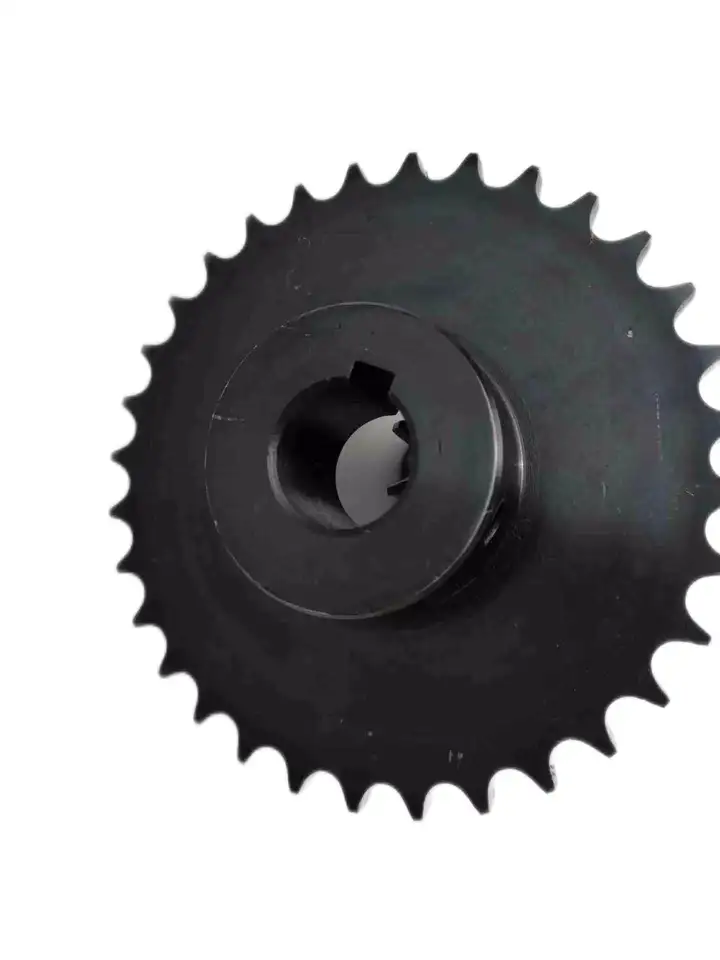
Calculating Torque Requirements for a wheel sprocket Assembly
Calculating the torque requirements for a wheel sprocket assembly involves considering various factors that contribute to the torque load. The torque requirement is crucial for selecting the appropriate motor or power source to drive the system effectively. Here’s a step-by-step guide:
- 1. Determine the Load Torque: Identify the torque required to overcome the resistance or load in the system. This includes the torque needed to move the load, overcome friction, and accelerate the load if applicable.
- 2. Identify the Sprocket Radius: Measure the radius of the sprocket (distance from the center of the sprocket to the point of contact with the chain or belt).
- 3. Calculate the Tension in the Chain or Belt: If using a chain or belt drive, calculate the tension in the chain or belt. Tension affects the torque required for power transmission.
- 4. Account for Efficiency Losses: Consider the efficiency of the system. Not all the input power will be converted into output power due to friction and other losses. Account for this efficiency in your calculations.
- 5. Use the Torque Equation: The torque (T) can be calculated using the following equation:
T = (Load Torque × Sprocket Radius) ÷ (Efficiency × Tension)
It’s essential to use consistent units of measurement (e.g., Newton meters or foot-pounds) for all values in the equation.
Remember that real-world conditions may vary, and it’s advisable to add a safety factor to your calculated torque requirements to ensure the system can handle unexpected peak loads or variations in operating conditions.

Special Considerations for Using a wheel sprocket System in Off-Road Vehicles
Off-road vehicles operate in rugged and challenging environments, which can put additional stress on the wheel sprocket system. Here are some special considerations to keep in mind when using a wheel sprocket system in off-road vehicles:
- Material Selection: Choose high-quality materials for the wheel sprocket that can withstand rough terrains, impacts, and exposure to elements. Materials like hardened steel or alloys with good impact resistance are commonly used.
- Sealing and Protection: Ensure that the wheel bearings and sprocket teeth are adequately sealed to prevent dirt, mud, water, and other debris from entering. Proper sealing helps to maintain smooth operation and prolong the lifespan of components.
- Reinforcement: Consider reinforcing the wheel sprocket assembly if the vehicle will encounter heavy loads or extreme conditions. Reinforcements can add strength and durability to handle challenging off-road conditions.
- Lubrication: Use a high-quality lubricant suitable for off-road conditions. Frequent lubrication is crucial to reduce friction, prevent corrosion, and protect components from wear and tear.
- Regular Inspection: Off-road vehicles experience higher vibrations and shocks, leading to accelerated wear. Perform regular inspections to detect any signs of damage, misalignment, or wear. Address issues promptly to avoid further problems.
- Shock Absorption: Consider incorporating shock-absorbing features or suspension systems to mitigate the impact on the wheel sprocket system during off-road driving. This helps to protect the components and improve overall vehicle performance.
- Environmental Considerations: Off-road environments often expose the wheel sprocket system to dirt, sand, water, and other harsh elements. Choose coatings or treatments that offer corrosion resistance to protect against environmental damage.
- Weight Consideration: Off-road vehicles may need to be lightweight to navigate difficult terrains effectively. Ensure the wheel sprocket components strike a balance between durability and weight to optimize vehicle performance.
- Service and Maintenance: Establish a regular maintenance schedule and perform necessary servicing after each off-road trip. Cleaning, inspection, and replacement of worn parts are vital to ensure the system’s reliability.
By taking these special considerations into account, the wheel sprocket system in off-road vehicles can withstand the demands of rough terrains and provide reliable performance in challenging environments.

Calculating Gear Ratio for a wheel sprocket Setup
In a wheel sprocket system, the gear ratio represents the relationship between the number of teeth on the sprocket and the number of teeth on the wheel. The gear ratio determines the speed and torque relationship between the two components. To calculate the gear ratio, use the following formula:
Gear Ratio = Number of Teeth on Sprocket ÷ Number of Teeth on Wheel
For example, if the sprocket has 20 teeth and the wheel has 60 teeth, the gear ratio would be:
Gear Ratio = 20 ÷ 60 = 1/3
The gear ratio can also be expressed as a decimal or percentage. In the above example, the gear ratio can be expressed as 0.3333 or 33.33%.
It’s important to note that the gear ratio affects the rotational speed and torque of the wheel sprocket. A gear ratio greater than 1 indicates that the sprocket’s speed is higher than the wheel’s speed, resulting in increased rotational speed and reduced torque at the wheel. Conversely, a gear ratio less than 1 indicates that the sprocket’s speed is lower than the wheel’s speed, resulting in decreased rotational speed and increased torque at the wheel.
The gear ratio is crucial in various applications where precise control of speed and torque is required, such as bicycles, automobiles, and industrial machinery.


editor by CX 2023-08-31
China supplier Agricultural Machinery Spur Gear Industrial Sprocket Wheel Chains and Sprockets Transmission Parts Wheels Factory best sprocket combination
Product Description
ZHangZhoug CZPT Machinery Co., Ltd
(DIN/ANSI/JIS Standard or made to drawing)
Product Description:
Detailed Photos:
Company Profile:
ZHangZhoug CZPT Machinery Co., Ltd. Is the vice chairman of chain Transmission Branch of China Machinery General parts Industry Association and a member of China chain Transmission Standardization Technical Committee.
Founded in 1954, mainly engaged in sprocket, gear, timing belt pulley, coupling production and sales, It is a large sprocket manufacturing enterprise in China, and it is also 1 of the largest standard sprocket manufacturers in the world at present. The product structure of the company has been developed from the single pattern of standard sprocket to non-standard transmission parts. Products are mainly sold in North America, South America, Europe, Africa and Japan, South Korea, the Middle East, Russia and Southeast Asia and other countries and regions, sales network all over the world.
The company has passed ISO 9002 quality assurance system certification for the first time in 1999, ISO9001: 2000 quality management system certification in 2003, ISO/TS16949 quality management system certification for the first time in 2009, ISO14001: 2004 environmental management system certification for the first time in 2571, ISO14001: 2015 environmental management system certification for 2017, and ISO9001: 2015 and IATF16949: 2016 quality management system certification for 2018. It lays a CZPT foundation for perfecting the internal management of the enterprise and opening up the external market.
The company adheres to the business philosophy of “Quality is life, technology is physique, delivery is moral, quantity is credit, service is kindred, cost is lifetime”, implementing “innovation-driven, twinning integration” upgrading strategy, promoting chain transmission products to excellence, and making every effort to create “harmonious cenfit, good quality cenfit, hundred years of cenfit”
| Standard Or Nonstandard: | Standard |
|---|---|
| Application: | Motor, Machinery, Agricultural Machinery, Car |
| Hardness: | Hardened Tooth Surface |
| Manufacturing Method: | Rolling Gear |
| Toothed Portion Shape: | Spur Gear |
| Material: | C45 |
| Customization: |
Available
| Customized Request |
|---|


editor by CX 2023-07-28
China supplier Spur Gear C45 Transmission Parts Sprocket Wheel Chains and Sprockets Wheels Factory drive sprocket
Product Description
ZHangZhoug CZPT Machinery Co., Ltd
(DIN/ANSI/JIS Standard or made to drawing)
Product Description:
Detailed Photos:
Company Profile:
ZHangZhoug CZPT Machinery Co., Ltd. Is the vice chairman of chain Transmission Branch of China Machinery General parts Industry Association and a member of China chain Transmission Standardization Technical Committee.
Founded in 1954, mainly engaged in sprocket, gear, timing belt pulley, coupling production and sales, It is a large sprocket manufacturing enterprise in China, and it is also 1 of the largest standard sprocket manufacturers in the world at present. The product structure of the company has been developed from the single pattern of standard sprocket to non-standard transmission parts. Products are mainly sold in North America, South America, Europe, Africa and Japan, South Korea, the Middle East, Russia and Southeast Asia and other countries and regions, sales network all over the world.
The company has passed ISO 9002 quality assurance system certification for the first time in 1999, ISO9001: 2000 quality management system certification in 2003, ISO/TS16949 quality management system certification for the first time in 2009, ISO14001: 2004 environmental management system certification for the first time in 2571, ISO14001: 2015 environmental management system certification for 2017, and ISO9001: 2015 and IATF16949: 2016 quality management system certification for 2018. It lays a CZPT foundation for perfecting the internal management of the enterprise and opening up the external market.
The company adheres to the business philosophy of “Quality is life, technology is physique, delivery is moral, quantity is credit, service is kindred, cost is lifetime”, implementing “innovation-driven, twinning integration” upgrading strategy, promoting chain transmission products to excellence, and making every effort to create “harmonious cenfit, good quality cenfit, hundred years of cenfit”
| Standard Or Nonstandard: | Standard |
|---|---|
| Application: | Motor, Machinery, Agricultural Machinery, Car |
| Hardness: | Hardened Tooth Surface |
| Manufacturing Method: | Rolling Gear |
| Toothed Portion Shape: | Spur Gear |
| Material: | C45 |
| Customization: |
Available
| Customized Request |
|---|
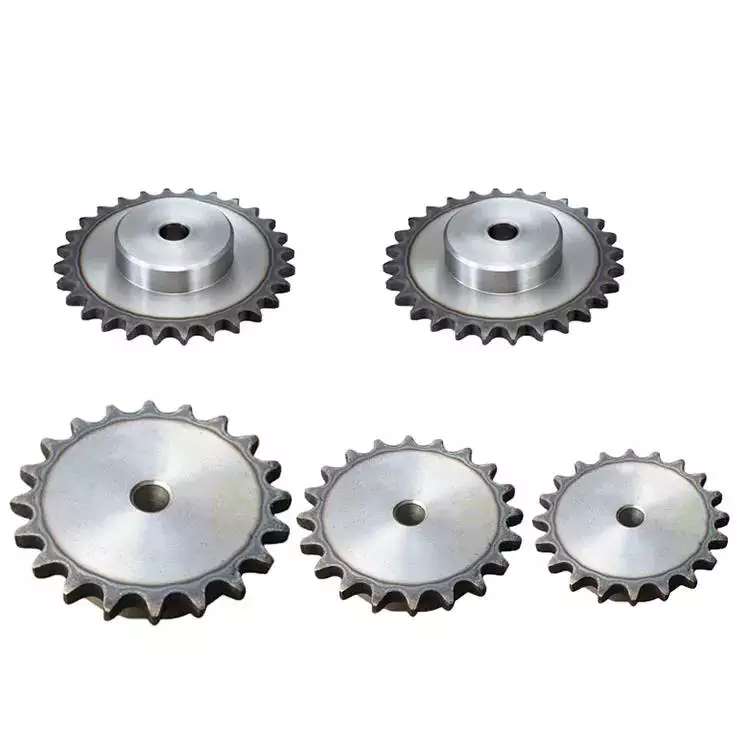
How to Use Sprocket for Conversion Optimization
The sprocket is usually attached to the shaft with one or more set screws. These set screws are usually ANSI standard sizes. However, these standards are not always suitable for all applications. Therefore, it is important to find a supplier who understands the correct keyway size for a specific application.
Typical sprocket
Typical sprocket hardnesses range from 35 to 40 HRC, depending on the application. However, some applications require lower hardness levels. The hardness level is determined by the material used to manufacture the sprocket. Further tempering can further reduce the hardness level. For example, conveyor sprockets with long pitch line thicknesses may not require hardening.
Steel is the most commonly used material for standard sprockets. However, many types of materials can also be used. The material used to make the sprocket depends largely on the type of equipment and tools used to make the sprocket. Steel is the most common building material because of its versatility and hardness and its use in a variety of applications. Bronze is another common material used for sprockets, usually in non-magnetic environments.
Another common material used for sprockets is reinforced plastic. While sprockets may look similar to gears, the main difference is their teeth and their ability to interlock with the chain. This allows simple rotational movement of large equipment and machinery.
The number of teeth on the sprocket is measured according to the number specified by the standard. An example is the ISO-DIN standard. A typical sprocket has an odd number of teeth to prevent the teeth from wearing out and causing the chain to slip.
A typical sprocket has rollers on the bottom and teeth on the top. When the chain meshes with the sprockets, the rollers get caught on the teeth. The rollers then pull the strap back, removing the extra force. However, if the bottom half of the chain is slack, the rollers will sit on the teeth and the chain will jump forward one tooth.
Function
Sprocket is an important feature for optimizing the user experience of your website. It works by analyzing user behavior on your website and delivering personalized interactions at the right time. This feature can also help you increase the conversion rate of your website. In this article, we’ll explore how to use Sprocket for conversion optimization.
The easiest way to explain the function of a chainring is to imagine a bicycle. The large sprocket is mounted on the pedal axle of the bike, and it drives the chain, which in turn drives the small sprocket on the rear wheel. The same principle is used for motorcycles and some other motor vehicles.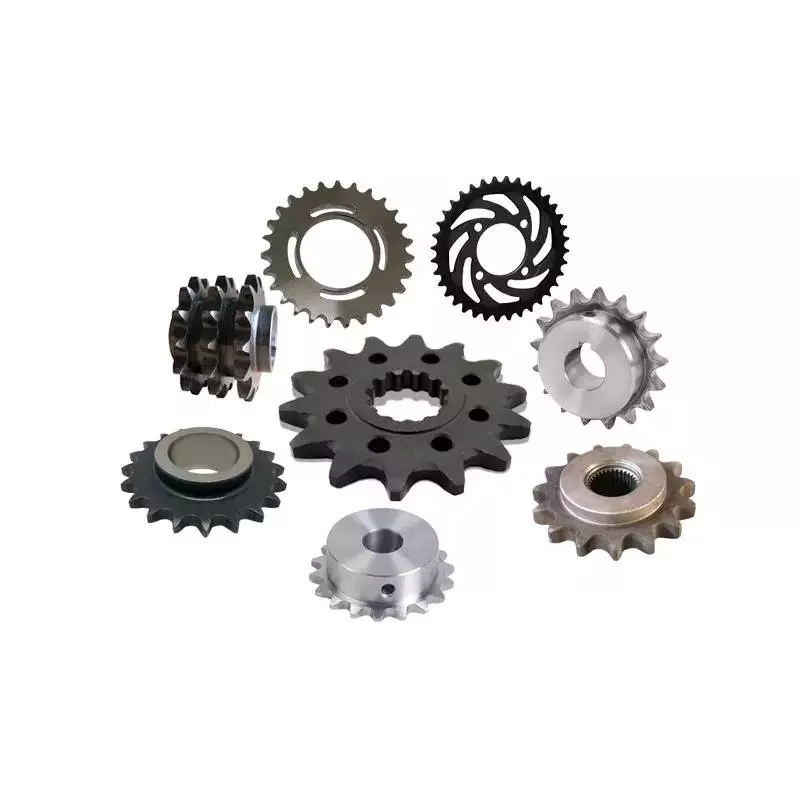
element
Sprocket assemblies are wheel-shaped assemblies that hold gears and other components in place. They allow precise rotation of large gears. They can be made of metal or reinforced plastic. Different designs are available to suit different applications. Here are some examples. Sprockets are used for heavy duty rollers.
The components 12 and 14 slide together in the axial direction relative to the drive shaft 18 . The protrusions 22 on one part fit into complementary shaped grooves on the other part. Usually, the two parts are the same, but they can be different. For example, jigsaw-shaped protrusions may fit into grooves in opposing portions.
Sprocket components are usually made of metal or reinforced plastic. They resemble gears due to their wheel-shaped design and teeth. However, sprockets interact with different types of chains. Most sprocket chain systems operate similarly to bicycle chain assemblies. To ensure proper performance, choose the correct one for your specific application.
Whether you’re buying sprockets for an electric car, bike, or construction project, make sure you choose the right sprocket. Sprockets are versatile. A single sprocket may have one or two teeth, while a triple sprocket may have two or more.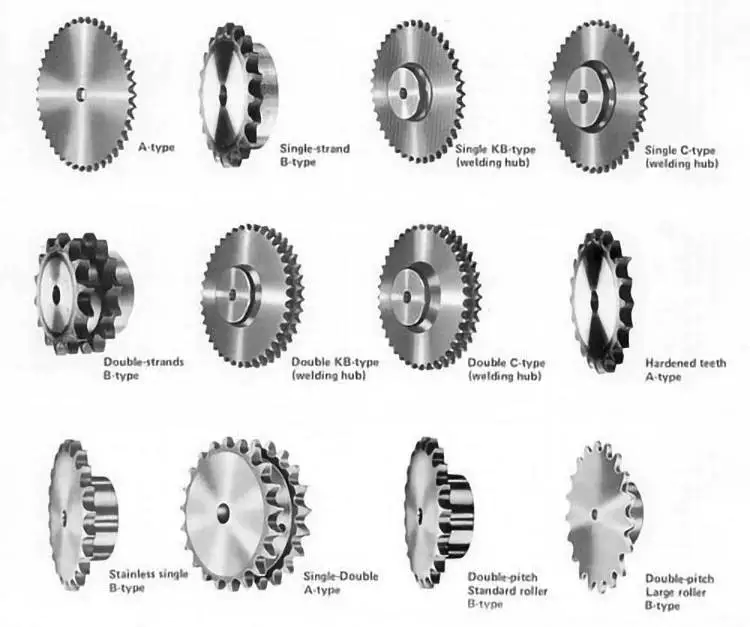
Put on
Proper maintenance of your bicycle’s chain and sprockets is critical to the performance and safety of your bicycle. These components wear out over time and should be replaced in the correct order. A well-maintained bike can go from 20,000 to 30,000 miles on one set of components. Mileage depends on the quality of the chain and sprockets and the type of riding style. For your safety and the performance of your bike, it is recommended to replace these components every few thousand miles.
Identifying a worn sprocket is easy; you can easily notice when a sprocket’s teeth are cut off. A badly worn sprocket will be unusable and your chain will end up stuck between the teeth. If the chain is damaged by worn sprockets, you should replace the chain.
When a chain or sprocket needs to be replaced, it is important to ensure that the sprocket is properly lubricated. Oiling will make the chain and sprocket more efficient and reduce the risk of damage. A good rule of thumb is to use anti-rust oil to protect your bike from corrosion.
In order to maintain the sprocket, you should follow the manufacturer’s maintenance instructions. You must replace them in the correct order. The first step is to remove the old sprocket and discard it. Old sprockets cannot be mixed with new sprockets.
It is also important to replace the front and rear sprockets when returning the chain. You should also lubricate the chain to prevent rust. Before lubricating, you can clean the chain with a non-petroleum-based cleaner. Don’t use oil as it doesn’t protect the chain from water and is more viscous.


editor by CX 2023-05-15
China 2020 Sprocket roller chain sprocket double sprocket chain transmission parts gear wholesaler
Guarantee: 3 many years
Applicable Industries: Building Materials Stores, Producing Plant, Equipment Fix Outlets, Foods & Beverage Manufacturing facility, Farms, Design works , Energy & Mining, Other
Custom-made help: OEM, ODM, OBM
Content: Metal, C45
Common: ANSI
Packing: Plastic bag + plywood circumstance
Teeth harden: Higher-frequency quenching
Software: Transmission Machine
Kind: customization/Standard Chain Wheel
Bore Kind: customization/Common
Tooth: ten-one hundred twenty
High quality: Higher-Quality
Packaging Information: 1. Plastic bag + Plywood circumstance 2. Plastic bag + Carton 3. As per customer’s ask for
Port: Xihu (West Lake) Dis.g, HangZhou, ZheJiang
Specification
| Business Kind | Manufacurer&Exporter |
| Material | S45C, 20CrMnTi, Reduced carbon steel, Cast Iron, Stainless metal, Coupling Producer LB3 Highly versatile tyre coupling Natural rubber 45# shaft hubs electrical power transmission motor pump link Copper and so forth |
| Production Process | Cutting→Forge →Lathe →Hobbing →Heat therapy →Surface treatment method |
| Heat Remedy | High-frequency quenching, Carburization and so on |
| Surface Treatment method | Oxide Black, Galvanzied, Nickel Plated, Printing and many others |
| Packing | Plastic bag+plywood circumstance Carton+plywood case etc |
| Model | Type A & Type B, One, Double, Triple -35B10-80,40B9-90,50B9-90,60B9-90, TS3ZF-94-2571 Locking Assemblies mini disc coupling Substantial Top quality 45# metal precision coupling stepmotor connector large torque 80B9-ninety,100B9-90,120B9-eighty,140B10-sixty,160B10-6006B10-a hundred twenty five,08B9-one hundred twenty five,10B9-125,12B9-125,16B9-one hundred twenty five,20B9-114,24B9-90,28B9-76,32B9-76 |
| Export Markets | North The usa, South The usa, Jap Europe, Southeast Asia, Africa, Hot Selling CZ Mirco Pave CZPT Appeal Crack Crystal Stone Beads Handmade Males Ladies Partners Macrame Bracelet Oceania, Mid East, Japanese Asia, Western Europe |
| Application | Industry sprockets can be usedin power driving, conveyor, lifting, mine, agricultural, food industry and so forth., with each other with rollerchains |
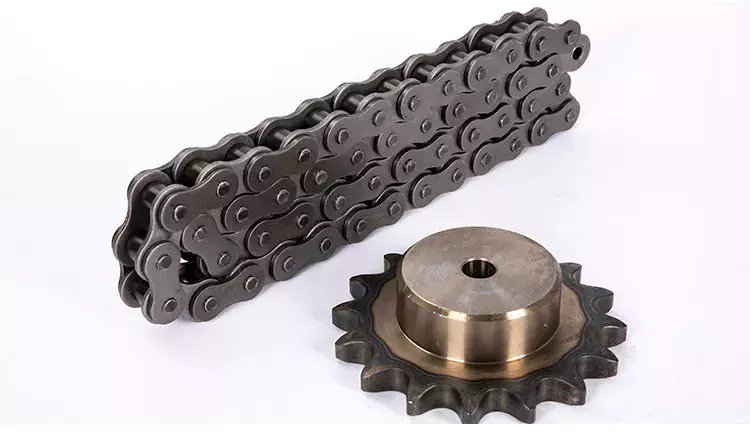
How to Identify a Sprocket
When choosing a sprocket, you have several options. There are several types, each with unique features. In this article, we’ll discuss how to identify sprockets, and how to replace worn or damaged sprockets.
buy sprockets
When building a bicycle, sprockets are an important part of the drivetrain. Unfortunately, they’re hard to find outside of places like CZPT. Fortunately, there are some easy ways to find the right sprocket for your bike.
The first thing to consider is what kind of sprocket you need. Choosing the wrong sprocket can damage your equipment or cause it to fail prematurely. While sprockets come in a variety of sizes, there are some key features that can help you find the right one.
There are two basic types of sprockets. You can choose one made of steel or aluminum, or a combination of both. Most sprockets are made of steel, but there are also new aluminum sprockets that are similar to steel and last as long as steel. No matter which material you choose, it’s important to choose a reputable manufacturer with regular maintenance.
Buying sprockets that match your chain is another way to ensure proper installation. The chain goes through the sprockets thousands of times per minute, so the teeth eventually wear out. Poorly maintained sprockets can also cause “hook” teeth, which will cause your chain to stretch to the point where you can no longer adjust it.
Identify sprockets
One of the most common bicycle parts is the sprocket, which can be identified by its width and number of teeth. A single sprocket has one tooth along its circumference, while a double sprocket has two rows of teeth. Sprockets are also known by different names, including single, double, triple, and quadruple sprockets.
Roller sprockets are another type of sprocket. It runs along a chain of rollers connected by pins. It fits into the gap between the rollers in the chain to transfer kinetic energy. There are two basic styles of roller sprockets: single pitch and double pitch. Single-pitch sprockets are small and fit snugly against the equipment, while double-pitch sprockets are larger and require more thickness to support the weight.
Checking a sprocket is easy if you know how to count teeth. A simple caliper will allow you to easily find sprockets with worn teeth. Calipers also allow you to measure the hole of the sprocket, which is the inside diameter of the sprocket.
Another way to tell if a sprocket is worn is to visually inspect the sprocket. Worn sprockets can cause the chain to bounce, putting more pressure on the bearings and accelerating wear. It is also important to check the alignment of the sprockets. If it’s off center, it probably means the chain needs to be replaced.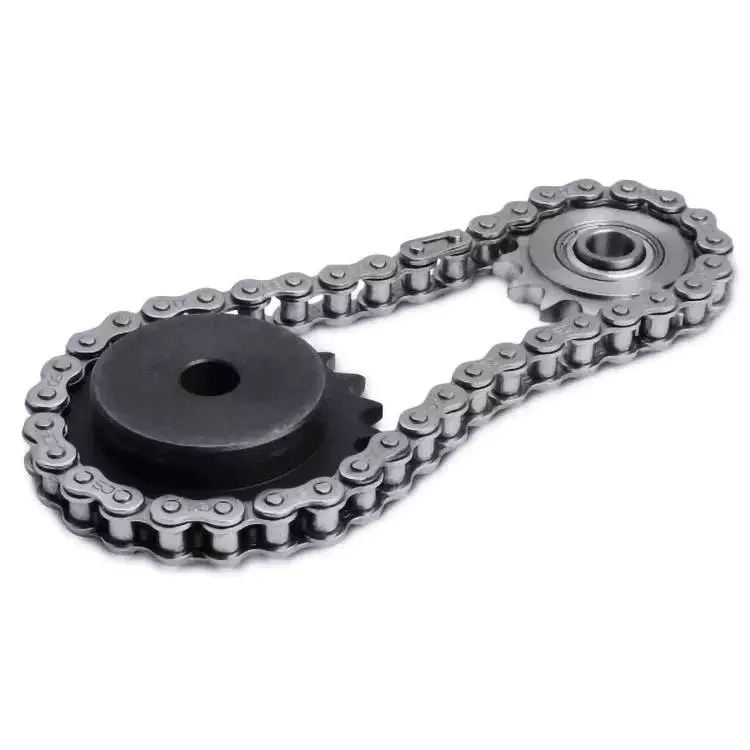
Replace sprocket
If you want to maintain your bike, it’s a good idea to replace your chain and sprockets regularly. If you don’t, you may have a problem that will only get worse. Worn chains can also make noise, so it’s a good idea to check them regularly. Also, you should lubricate and tighten them regularly, especially when they reach their maximum mileage.
First, you need to determine the size of the chain. Usually, you’ll find it in the manual. Common sizes are 520, 525, and 530. The first number refers to the pitch of the chain, which is the distance between the rivets, while the second number refers to the width of the sprocket. For example, a 20-tooth sprocket is two and a half inches wide.
Replacing a sprocket is a relatively simple process. Be sure to clean the bike and apply wheel bearing grease before tackling the task. Next, remove the old chain from the rear wheel. Some bikes may have clevises or side panels that need to be removed. A flat-blade screwdriver works well for this problem. You can also use the Broken Links tool to remove split links.
You can also install new sprockets on your bike. After removing the old one, be sure to follow the manufacturer’s instructions for chain and sprocket size. You should also tighten the sprocket nut to the manufacturer’s torque setting. Once you’ve done this, be sure to check the chain tension to make sure it’s not too loose or too tight.
Replace worn chains
To prevent damage to the chain, the chain must be replaced regularly. It’s prone to wear and tear, but you can extend the life of your bike’s chain with a few simple steps. One of the steps is to lift the rear wheel of the bike so you can run the new chain through the rear derailleur. This will make the task easier because your bike won’t be lying on the floor. If you don’t have a bike rack, you can use cinder blocks, wood, or boxes to support your bike rack.
The most obvious sign is yIf your chain bounces under load, our chainrings need to be replaced. Using a chain gauge will let you know when you need a new chain. Chain gauges usually consist of two sides and are used to measure the amount of wear on the chain under a given load. You can check the gauge by placing it on the chain and making sure it sinks into the chain.
First, you need to delete the old chain. Some older chains use uniform pins that you can use to replace them. Make sure to get a chain that is the same length as the old one. Also, pay attention to the type of drivetrain your bike has. For example, if it has a rear derailleur, you will need a chain that matches the same drivetrain.
Check the sprocket for rust
One of the best ways to check your bike for rust is to look for surface rust. This is the first sign that the metal is starting to oxidize. Using a steel brush to remove surface rust is a good idea, but be sure to wear safety glasses. You can also clean the sprockets with WD-40 or kerosene.
Another indicator that a sprocket needs to be replaced is excessive wear. This may be caused by foreign objects conveyed by the chain. It may also be necessary to center the chain and drive sprocket and install guide rollers. Other signs of sprocket rust include excessive vibration due to improperly machined axle holes or a bent or bent chain.
You should also look for any kinks in the chain. If so, you may need to replace the chain. Also, look for any rust spots and excess grease. Also, you should check the sprockets to make sure they are properly aligned.
Besides rust, another sign of rust is the chain jumping out of the sprocket. This can cause the chain to jam and cause your bike to slip. This situation is also dangerous for you and other drivers.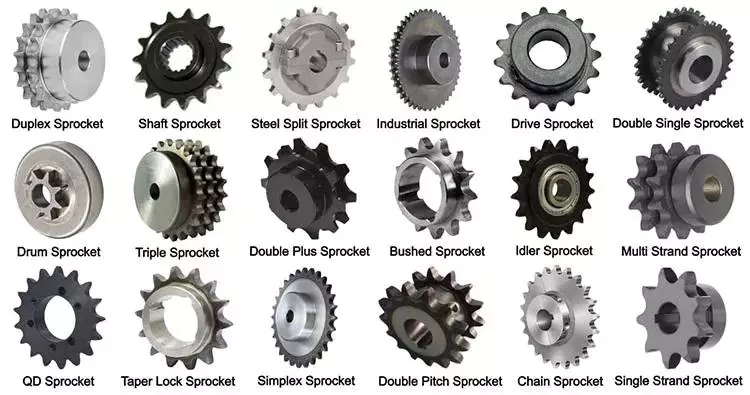
Replace worn sprockets
You can repair your bike’s gears by replacing the sprockets. You should always check the chain for any signs of wear. In the case of a worn sprocket, you should check the teeth, which are usually tall and hooked.
If the sprocket is curled, skewed, or uneven, the sprocket is worn and needs to be replaced. If the sprockets are not replaced, they will wear out the chain very quickly. Chains should be replaced as soon as they show signs of excessive wear.
To replace a worn sprocket, you must first remove the old rear sprocket. To do this, loosen the bolts that hold the sprocket in place. You should also clean the hub surface with steel wool to reduce corrosion and wear.
Worn sprockets have worn teeth that keep the roller chain from slipping. This can cause the chain to climb up the sprockets and make a lot of noise. In addition to noise, chains can stick to worn sprockets and damage sprockets and chain. Don’t wait until the chain is out of control to fix it.
After the sprocket is removed, the rear sprocket and drive sprocket can be replaced. It is important to check the alignment of the sprockets, as incorrect alignment can cause premature chain wear. Proper alignment will distribute the load evenly across the entire width of the chain, extending the life of the chain. You can check the sprocket with a ruler or laser sight tool.


editor by Cx 2023-05-08
China Roller Chain Sprocket Conveyor Tensioner Double Bike Transmission Instant Drive Taper Engineer Class Gear Duplex Stainless Steel Industrial Aluminum Sprockets drive sprocket
Merchandise Description
Roller Chain Sprocket Conveyor Tensioner Double Bike Transmission Instant Drive Taper Engineer Course Equipment Duplex Stainless Metal Industrial Aluminum sprockets
The roller chain sprockets can be divided into 3 styles with distinct outer diameters and strategy data.
The kind A roller chain sprocket has the most straightforward framework, which is simple and with out any extensions on both facet. It delivers a stable and secure attachment to the shaft. The variety B and type C roller chain sprockets have 1 hub extensions on 1 or both side to supply stability, and let for the use of complete-depth keyways and standard setscrews to attach the sprocket. They can also accommodate a extensive assortment of shafts.
|
US $1-99 / Piece | |
100 Pieces (Min. Order) |
###
| Standard Or Nonstandard: | Standard |
|---|---|
| Application: | Motor, Motorcycle, Machinery, Agricultural Machinery, Car |
| Hardness: | Hardened Tooth Surface |
| Manufacturing Method: | Rolling Gear |
| Toothed Portion Shape: | Spur Gear |
| Material: | Stainless Steel |
###
| Samples: |
US$ 9999/Piece
1 Piece(Min.Order) |
|---|
|
US $1-99 / Piece | |
100 Pieces (Min. Order) |
###
| Standard Or Nonstandard: | Standard |
|---|---|
| Application: | Motor, Motorcycle, Machinery, Agricultural Machinery, Car |
| Hardness: | Hardened Tooth Surface |
| Manufacturing Method: | Rolling Gear |
| Toothed Portion Shape: | Spur Gear |
| Material: | Stainless Steel |
###
| Samples: |
US$ 9999/Piece
1 Piece(Min.Order) |
|---|
Problems with sprockets
If you’re having trouble with your HP Sprocket, you’re not alone. This bike component isn’t without issues, but it’s also susceptible to other wear and tear. Check for worn tooth surfaces and hooked tips. When teeth wear out quickly, they can break the chain, so make sure you fix them as soon as possible.
You can solve this issue by installing the latest firmware update for your Sprocket printer. The firmware update is designed to provide a safe and reliable printing experience. When your Sprocket printer doesn’t print the pictures, it is likely because it’s not receiving enough power from the battery. Make sure the battery is at least 25% before you begin.
Insufficient or improper lubrication can cause a variety of problems. Proper lubrication can prevent or remove excessive wear, or protect the chain from the environment. It can also reduce the risk of excessive chain slack. The following are just a few common problems that can cause slack in the chain.
In case of excessive wear, a new sprocket may be necessary. If the sprocket and chain do not match, replace them with a similar size. In addition, a shock absorber can be installed to minimize load. Another alternative is to install a take-up idler, which helps prevent excessive chain elongation.
Improper alignment of the sprocket is another common cause of chain drive problems. If the sprocket is not aligned correctly, it will not be able to move smoothly through the chain during rotation. The teeth of the sprocket will become hooked, preventing the roller from smoothly moving through. This will force the roller chain to cling to the sprocket, and need to be replaced.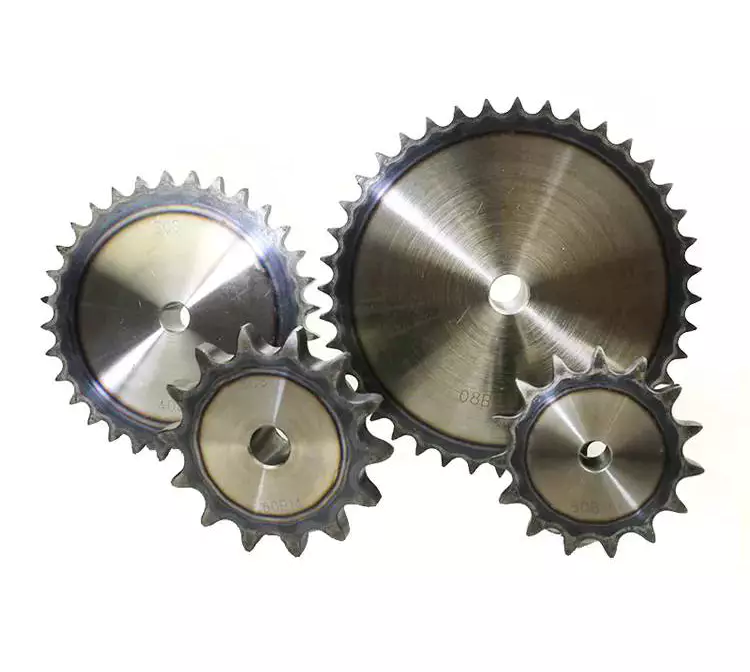
Common types of sprockets
Power transmission equipment typically utilizes sprockets and chains. These are used in pairs to provide speed reduction. They are different from gears because the teeth of the sprocket do not mesh with those of the mating gears. They are typically made of plastic, but they can also be made of metal.
There are many common types of sprockets and chains. Some of these types of sprockets have large, narrow, or variable tooth pitch. The size of the sprocket depends on the size and pitch of the chain. If you are using a chain with a large pitch diameter, you should use a sprocket with large teeth. Conversely, a smaller pitch diameter will require a sprocket with small teeth.
Another way to identify the type of sprocket you’re using is to look at the number of strands. Single-strand sprockets are the most common, but you’ll also find many types that have multiple strands of chains. Multi-strand chains are generally larger and allow for greater torque to be transmitted from a common central shaft.
Another type is flat sprockets, which have no hub and drive through a series of holes. They are used for transmission of power or material in chain-driven systems, such as bicycles. They can also be used for overhead conveyors. In some cases, there is a special type that fits the shaft of an automobile, such as a transmission shaft.
There are many different types of sprockets, each with a unique function. Some are used for conveyor chains, while others are used for other applications. In most cases, sprockets are used in chain-driven machinery. They come in different sizes and pitches and are designed to work with particular types of chains.
When choosing a motor or transmission system, it is important to match sprockets and chains. A perfectly matched set of components will ensure that the motor and transmission work together. Generally, this alignment comes down to sprocket-to-sprocket matching. The process involves jacking up the motor and lining up the sprockets and chains. Then, the sprockets and chains are locked into place with cotter pins.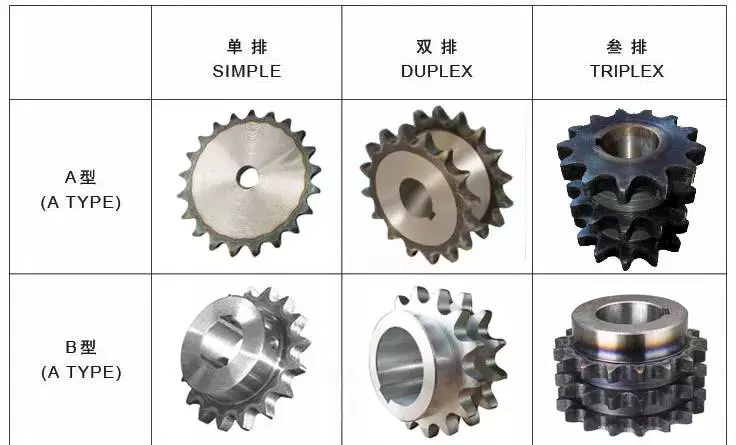
Size of sprockets
To determine the correct chain length and sprocket diameter, the first step is to understand the difference between the diameters of the sprockets and cassettes. The smaller the diameters of sprockets, the lower the chain tension. The larger the sprocket, the longer the chain will need to be. This process requires the use of a derailleur that can roll a larger number of chains.
In addition to chain length, the spacing between sprockets is another important factor. If the sprockets are too far apart, the chain may slip through the sprocket. A smaller range of sprockets will prevent this and will increase the number of discrete gear ratios. In addition, if the chain skips over a sprocket, it will cause discomfort in shifting.
Choosing the correct size of sprockets is essential for cycling. Larger sprockets are usually necessary for road bikes. Likewise, a road bike will have larger gears than a gravel bike. Larger gears will help the cyclist accelerate more smoothly and ensure a smoother ride.
Using a chain calculator can help you determine the proper size of sprockets for your bike. You can also use a chain length calculator to determine the correct chain length. This calculator uses the distance between the sprockets to calculate chain length. However, it is important to note that it is not possible to calculate the length of a chain with a single sprocket.
The size of the sprocket must be in proportion to the length of the chain. It can be controlled by either adjusting the center of the sprocket or moving it to the proper position. The center of rotation of the sprocket is defined by the chosen geometry reference.
The report covers global and regional sales of sprockets. It also contains information on competitive dynamics and market concentration status. Moreover, the report includes detailed information about the manufacturers of sprockets. The study also includes regional and global market forecasts. It also provides a detailed breakdown of sales by type, application, and region.
When choosing the right size of sprockets, remember to take measurements and do some arithmetic. For example, a smaller countershaft sprocket will improve low-speed acceleration, while a larger rear sprocket will improve fuel mileage. In addition, it is recommended that you use the reverse sprocket size if you’re going to be riding on long highways.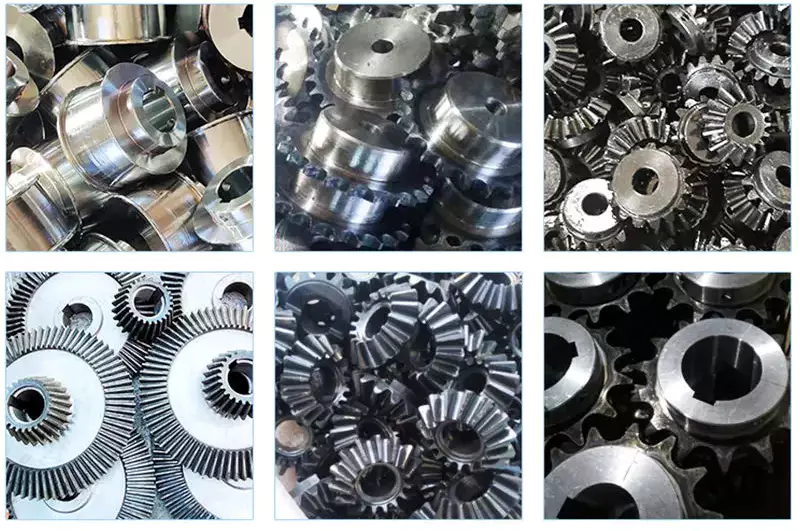
Maintenance of sprockets
Proper maintenance of sprockets and chains is crucial to the functioning of your bike. It is important to avoid overstretching them. If this happens, they will not fit properly and will require replacement. It is also important to prevent the kinks in your chain to reduce the amount of stress on your sprockets.
If you are unsure of the state of your sprockets and chains, you can replace them with a new chain and a new sprocket. If you notice that a chain is squeezing between the rear sprocket, it is time to replace the sprocket.
Proper maintenance of sprockets and chains involves cleaning and lubrication. Regular cleaning and lubrication can prevent damage and extend the life cycle of these parts. Proper lubrication will also ensure their smooth operation and minimize the noise. Regardless of whether your sprockets or chains are new or used, lubrication should be carried out at regular intervals to extend their useful life cycle.
Proper alignment of the sprockets and chains will ensure the most efficient performance and reliability. If you regularly change your chain and sprockets, you can prolong the life of these components and avoid costly repairs. Make sure you change the sprockets and chains only with professional mechanics. Always follow the instructions of the motorcycle manufacturer.
Proper maintenance of sprockets and chains is important to prevent premature sprocket replacement. Changing the sprocket too often can result in poor meshing, accelerating wear and tear of the new sprockets. When changing the sprocket, it is essential to turn the worn surface over before you install the new one.
It is important to follow the instructions and warning signs for proper maintenance of sprockets and chains. The safety of the workers and the environment should be prioritized. Follow the instructions of the manufacturer and avoid dangerous situations. It is essential not to anneal or electroplate the chain parts.
Proper lubrication is also vital. Use a non-petroleum based cleaner to clean the chain thoroughly and then apply lubricant. Avoid using engine oil as it is more viscous and cannot protect the chain against water.


editor by czh 2023-01-02
China Honda Cg Fan 125 New Motorcycle Sprocket Wheel Kit and Chain Transmission Sprocket Gear High Quality for Honda Cg150 Motorcycle Part Repuesto PARA Moto Mtosir chain sprocket
Product Description
| Item Identify | Motorcycle Transmission Package, Chain & Sprocket Package |
| Delivery Time | 30-forty five Functioning Days |
| Good quality | 100% Tested |
| Shade | Silver |
| MOQ | 500 |
| Packing | MTOSIR Packing / Neutral Packing / Customed Packing |
| Certification | ISO9001 |
| Manufacturer | MTOSIR, OEM |
| Materials | Metal |
| Support | OEM, Layout, buyer brand provider offered |
| Design | HONDA CG Admirer 125 NEW |
| Port of Cargo | HangZhou / ZheJiang |
FAQ
Q1. What is your terms of packing?
A: Usually, we pack our products in neutral white packing containers and brown cartons or our brand name”MTOSIR” packing. If you have lawfully registered patent, we can pack the items in your branded boxes following receiving your authorization letters.
Q2. What is your terms of payment?
A: T/T 30% as deposit, and 70% just before delivery. We will demonstrate you the images of the items and packages before you pay the equilibrium.
Q3. What is your conditions of supply?
A: EXW, FOB, CFR, CIF, DDU.
Q4. How about your supply time?
A: Normally, it will just take 30 to sixty days after receiving your advance payment. The particular shipping and delivery time is dependent on the things and the amount of your purchase.
Q5. Can you create according to the samples?
A: Sure, we can generate by your samples or complex drawings. We can build the molds and fixtures.
Q6. What is your sample coverage?
A: We can supply the sample if we have all set elements in stock, but the consumers have to pay out the sample value and the courier price. When consumer area order, we will return the sample price.
Q7: How do you make our business lengthy-expression and excellent romantic relationship?
A: We maintain good quality and aggressive price to ensure our consumers benefit.
| To Be Negotiated | 500 Sets (Min. Order) |
###
| Warranty: | 1 Year |
|---|---|
| Material: | Stainless Steel |
| Certification: | ISO9001:2001 |
| Transport Package: | Carton |
| Trademark: | MTOSIR |
| Origin: | China |
###
| Samples: |
US$ 10/Set
1 Set(Min.Order) |
|---|
###
| Customization: |
Available
|
|---|
###
| Product Name | Motorcycle Transmission Kit, Chain & Sprocket Kit |
| Delivery Time | 30-45 Working Days |
| Quality | 100% Tested |
| Color | Silver |
| MOQ | 500 |
| Packing | MTOSIR Packing / Neutral Packing / Customed Packing |
| Certification | ISO9001 |
| Brand | MTOSIR, OEM |
| Material | Metal |
| Service | OEM, Design, buyer logo service offered |
| Model | HONDA CG FAN 125 NEW |
| Port of Shipment | Ningbo / Shanghai |
| To Be Negotiated | 500 Sets (Min. Order) |
###
| Warranty: | 1 Year |
|---|---|
| Material: | Stainless Steel |
| Certification: | ISO9001:2001 |
| Transport Package: | Carton |
| Trademark: | MTOSIR |
| Origin: | China |
###
| Samples: |
US$ 10/Set
1 Set(Min.Order) |
|---|
###
| Customization: |
Available
|
|---|
###
| Product Name | Motorcycle Transmission Kit, Chain & Sprocket Kit |
| Delivery Time | 30-45 Working Days |
| Quality | 100% Tested |
| Color | Silver |
| MOQ | 500 |
| Packing | MTOSIR Packing / Neutral Packing / Customed Packing |
| Certification | ISO9001 |
| Brand | MTOSIR, OEM |
| Material | Metal |
| Service | OEM, Design, buyer logo service offered |
| Model | HONDA CG FAN 125 NEW |
| Port of Shipment | Ningbo / Shanghai |
Select sprocket
If you are in the market for a new sprocket, there are several factors to consider. There are two basic types of sprockets: roller sprockets and flat bore sprockets. Each has its pros and cons, so it’s important to choose the right one for your needs.
Roller sprocket
A roller sprocket is a mechanical device used to turn a rotating shaft. The size of the sprocket depends on its speed and the size of the chain. It has a wide range of applications. In addition, it is a versatile mechanical device that is an excellent choice for a variety of applications.
To understand the design of a roller sprocket, you can draw an outline on a piece of paper and draw the radius of the roller. This will help you understand how your teeth are configured. For example, if the teeth of the sprocket are round, the rollers will have a semi-circular profile. Likewise, if the roller is linear, the arc will be tangent to the base circle. This will ensure smooth movement of the rollers, while also transmitting rotational motion with high precision.
The length of the roller chain varies depending on the drive type. In adjustable center drives, the chain should be replaced at 3% elongation, while fixed center drives should be replaced at 15% elongation. You can also check the chain condition of the sprocket by pulling the chain out of the larger sprocket. If the chain is moving off the larger sprocket, it is time to replace the roller chain. Neglecting this aspect can result in damage to the sprocket.
The present invention relates to the manufacture of chain drive sprockets with a backlash-free mechanism. This is achieved by providing a center-to-center offset between the sprocket and roller connection lines. The resulting chain drive is backlash-free and allows full contact between the rollers and teeth.
Roller sprockets are critical components to ensure maximum efficiency and uptime. Its dimensions—bore bore, hub diameter, and through-hole length—are important. Additionally, the size of the roller sprockets varies according to the chain pitch, which is the distance between the centers of the roller pins. Roller sprockets can be made of different materials, depending on their purpose. Most sprockets are made of metal or reinforced plastic. Some have bosses, some are shaped like wheels. Sprockets can be made of easily machined steel or resin. Different types of chains will engage different sprockets.
Roller sprockets can be made of different materials, depending on their purpose. Most sprockets are made of metal or reinforced plastic. Some have bosses, some are shaped like wheels. Sprockets can be made of easily machined steel or resin. Different types of chains will engage different sprockets.
In addition to being used to mesh with chain drives, roller sprockets come in many different styles and bores. They are versatile and are often used with roller chains. Some are made of 1045CD carbon steel and have hardened teeth. Additionally, they are fully ANSI B29.1 compliant and some are manufactured for OEMs and aftermarket suppliers.
Flat hole sprocket
Flat bore sprockets are sprockets that are not specially machined. Flat bore sprockets do not have set screws, keyways or other special features. These features often require additional machining prior to installation. An important thing to keep in mind when buying a flat bore sprocket is the maximum bore. This refers to the maximum size that can be drilled without compromising structural integrity. Such measurements are usually listed in supplier directories.
Flat bore sprockets are available with standard bore or metric bore. Sprockets are used with specific chains. All chains are manufactured to a standard called “pitch”. The pitch is the distance from the center of one needle to the center of the next needle.
Steel split sprocket
Steel split sprockets can be used in a variety of industrial applications. These sprockets can be used in a range of applications, from forestry and mining to food and plastics processing. These types of sprockets are available in a variety of bores, tooth counts, and sprocket styles. Some types are also abrasion resistant.
There are several manufacturers that offer steel split sprockets. Made from high carbon steel, they are available in split, solid and removable rim versions. These sprockets are also suitable for hydraulic or pneumatic systems. Some manufacturers also offer service and support, including life cycle performance analysis, customer part numbers, and barcodes.
Split sprockets are ideal for applications where the drive shaft is large and multiple sprockets are mounted on the same shaft. For example, large conveyor chain sprockets may require the use of a crane to install and may result in increased downtime. Split sprockets also make installation in tight spaces easier. They can also be easily assembled without disassembling the shaft assembly.
Split sprockets are available in stock and custom sizes. small Stainless steel sprockets are also available, as are split flat top conveyor sprockets. They are commonly used in conveyors and robotic systems. Certain types of sprockets are suitable for specific applications, including woodworking, food processing, and woodworking.
Dimensions of split sprockets may vary by application. For example, split hub sprockets can range from one-half inch to one-tenth of an inch. Additionally, split hub sprockets have bolt circle diameters ranging from three-quarters to thirteen inches.


editor by czh 2022-12-16
in Shimkent Kazakhstan sales price shop near me near me shop factory supplier Manufacturing High Precision Steel Spur Gear Transmission Machining Worm Spur Bevel Gear for Oil Pump Sintered Parts manufacturer best Cost Custom Cheap wholesaler

Our solution variety also handles locking assemblies (clamping components/locking system), taper bushes, QD bushes, bolt-on hubs, torque limiters, shaft collars, motor bases and motor slides, chain detachers, chain guides, common joint, rod ends and yokes. Because of to our sincerity in offering very best support to our clients, knowing of your needs and overriding feeling of responsibility towards filling purchasing requirements, EPG is a skilled producer and exporter that is worried with the style, development and generation.
EPT EPT EPT Steel Spur EPT EPTT Machining Worm Spur EPTTl EPT For Oil EPT Sintered Parts


China manufacturer & factory supplier for Custom in Kitwe Zambia cnc machining transmission counter shaft gear With high quality best price & service
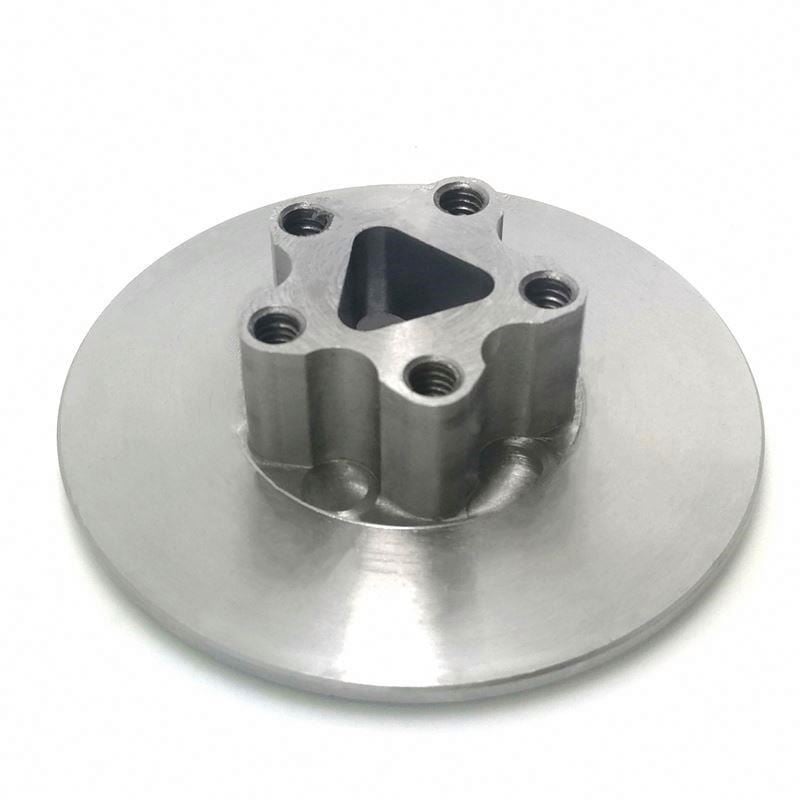
EPG energy transmission goods are designed to produce equally dependable overall performance and expense-effectiveness. Each item is utility-analyzed and engineered to meet up with stringent standards for uniformity in dimension, heat treatment method, tensile toughness and other essential attributes. As a value-effective different made specifically for general-responsibility use, EPG’s increasing line of items are obtainable in all frequently requested measurements and specifications, like ball bearings, mounted units, roller chain, seals, gauges, sheaves and a lot more.Having gathered precious encounter in cooperating with foreign consumers, a specialised supplier of a complete selection of chains, sprockets, gears, equipment racks, V-belts, couplings and reducers, pto shaft, agricultural gearboxes….
OUR Large-Stop Section: Obtaining THE Very best Solution FOR THE Buyer The large-end segment often requires custom-made options. In these cases, we give you with in-depth consulting in order to devise a common remedy to meet up with your specifications. Only then do we get down to the actual perform.
Overview
Rapid Particulars
- Relevant Industries:
-
Producing Plant
- Model Title:
-
OEM
- OEM Service:
-
Assistance
- Tolerance:
-
.01-.05mm or Custom-made
- Certification:
-
ISO9001, SGS
- Floor Therapy:
-
Sandblasting,Polishing,Anodize, Zinc,Nickel,Chrome,Plating, and many others.
- Application:
-
Car,Medical Equipments,Electric Appliance,Hardware,and many others.
- Dimension:
-
As Customers’ Request
Slip Clutch PTO Shaft for Compact Tractor Tillers NEW SLIPCLUTCH PTO SHAFT FOR COMPACT TRACTOR TILLERS ROTO TILLERS BUSHHOG RHINO KINGKUTTER,CARONI,MASCHIO,JOHN DEERE, MOST Designs 3 various sorts of PTO in operation: a non shear, shear pin and slip clutch — the last becoming the most expensive. Put into action conclude of non shear (r) and shear type (l) Non shear: this is a solid yoke to yoke established up and used with the expectation that particular tools will not experience any unexpected stops. I figure that the ending mower does not need a shear established up as the blades will slip to a diploma becoming belt driven and my other mower, the flail mower, is very forgiving in its design.
- Products:
-
Milling/Lathe/Drilling/Four/A few Axis CNC Machining Centre
- Drawing Format:
-
Professional/E, Automobile CAD, Strong Performs,IGS,UG, CAD/CAM/CAE
Provide Ability
- Source Capability:
- ten thousand Piece/Pieces for every Thirty day period
Packaging & Delivery
- Port
- nb
-
Guide Time
: -
Amount(Pieces) one – five hundred >500 Est. Time(days) thirty To be negotiated
On the internet Customization
Custom cnc machining transmission counter shaft equipment
Item Description
| Product Kind | CNC turning, milling, drilling, grinding, wire EDM chopping and so forth. |
| Our Services | CNC Machining,Plastic Injection,Stamping,Die Casting,Silicone And Rubber,Aluminum Extrusion,Mould Generating,and so on |
| Material | Aluminum,Brass,Stainless Metal,Copper,Plastic,Wood,Silicone,Rubber,Or as for every the customers’ demands |
| Surface Remedy |
Anodizing,Sandblasting,Portray,Powder coating,Plating,Silk Printing,Brushing,Sprucing,Laser Engraving |
| Dimension | As customers’ request |
| Service Project | To give creation style, generation and technical provider, mould development and processing, etc |
| Drawing Format: | PRO/E, Auto CAD, Solid Performs,IGS,UG, CAD/CAM/CAE |
| Testing Machine | Digital Top Gauge, caliper, Coordinate measuring machine, projection machine, roughness tester, hardness tester and so on |
| Industry utilized | Machinery heavy responsibility equipment electronic system Automobile spare parts optical telecommunication |
| Packing | Eco-welcoming pp bag / EPE Foam /Carton boxes or picket boxes As customer’s particular requirements |
| Trial sample time | 7-10 times right after confirmation |
| Delivery time | 7-30 times after receive the pre-payments |
| Payment Phrases | T/T,Western Union,Paypal |
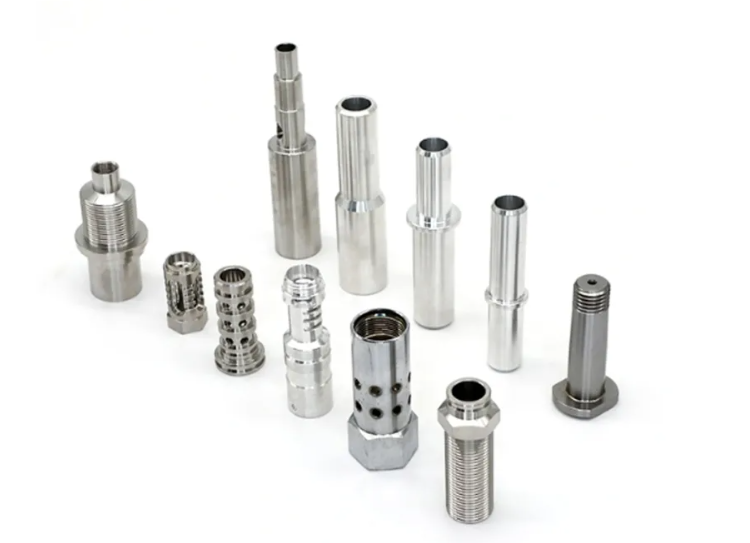

A lot more support
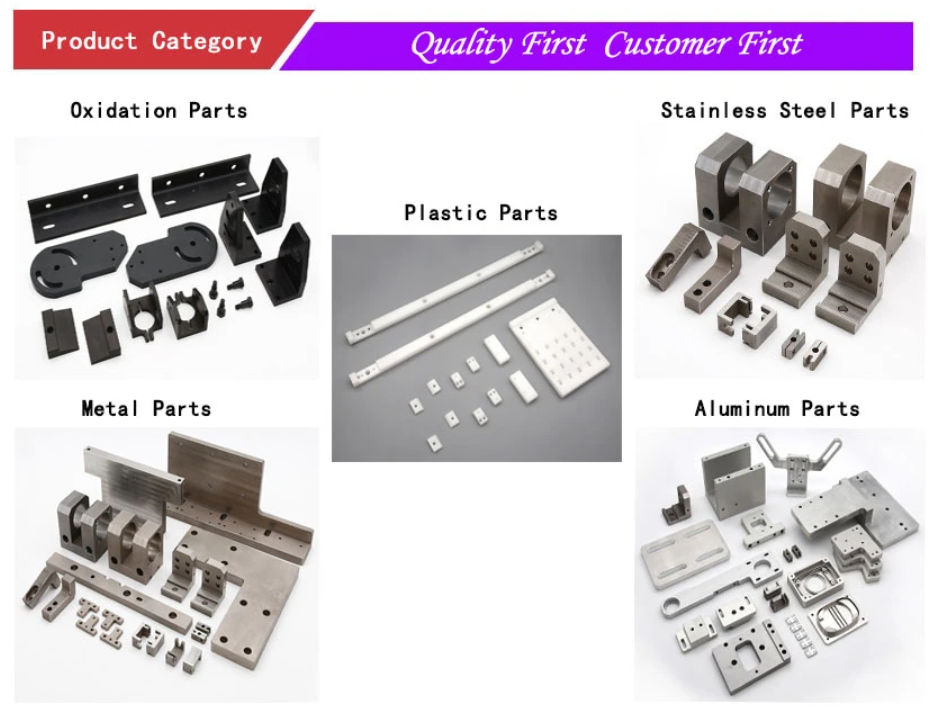

Far more Creation Element
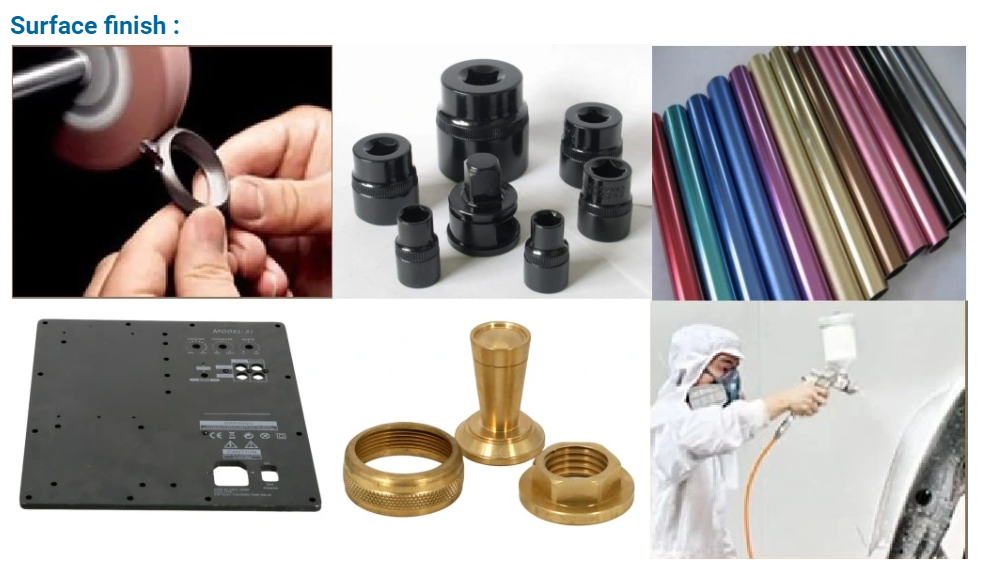

Surface Treatment
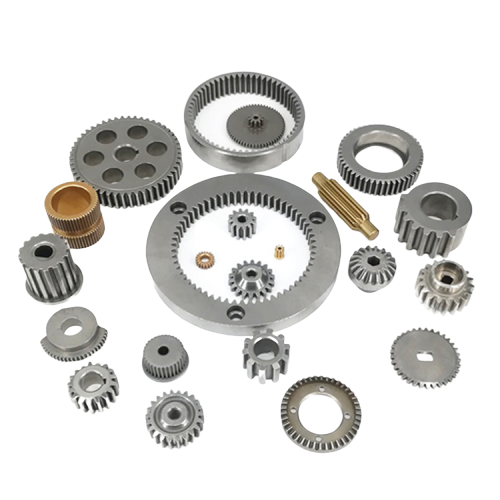

Creation Method
Why Us
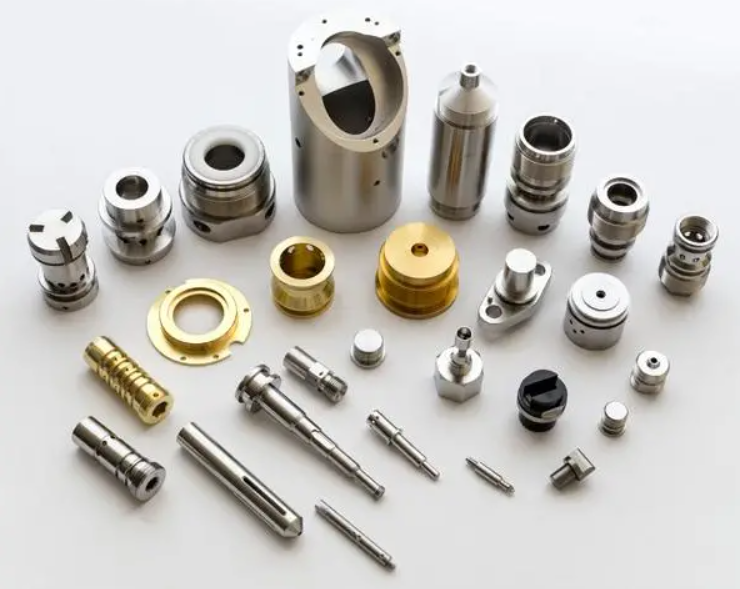

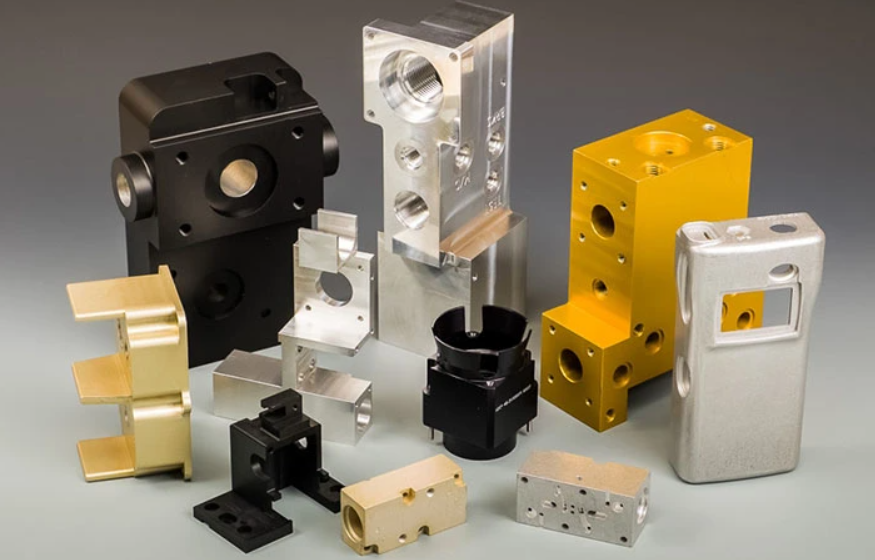

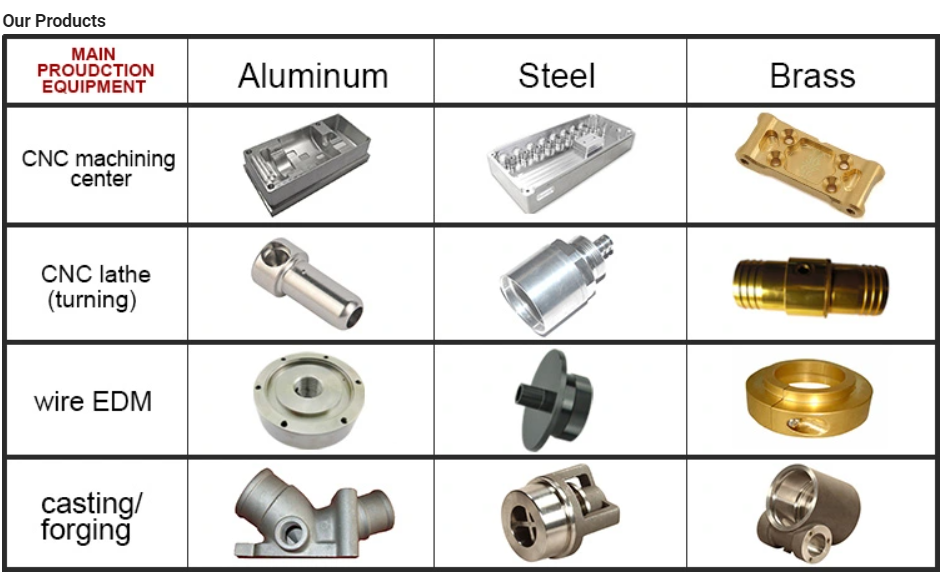 Our firm is located in XiHu HangZhou Zhejiang Province. T
Our firm is located in XiHu HangZhou Zhejiang Province. T
